Management Accounting Report for Tech (UK) Limited
VerifiedAdded on 2024/05/21
|28
|4253
|242
AI Summary
This report delves into the intricacies of management accounting, focusing on its application within Tech (UK) Limited. It explores the distinction between management and financial accounting, highlighting the essential requirements of a robust management accounting system. The report further examines various costing techniques, including marginal and absorption costing, and their role in preparing income statements. It also analyzes different types of budgets, their advantages and disadvantages, and their importance in planning and control. The report concludes by examining the balance scorecard approach and its application in managing financial problems to achieve sustainable success.
Contribute Materials
Your contribution can guide someone’s learning journey. Share your
documents today.
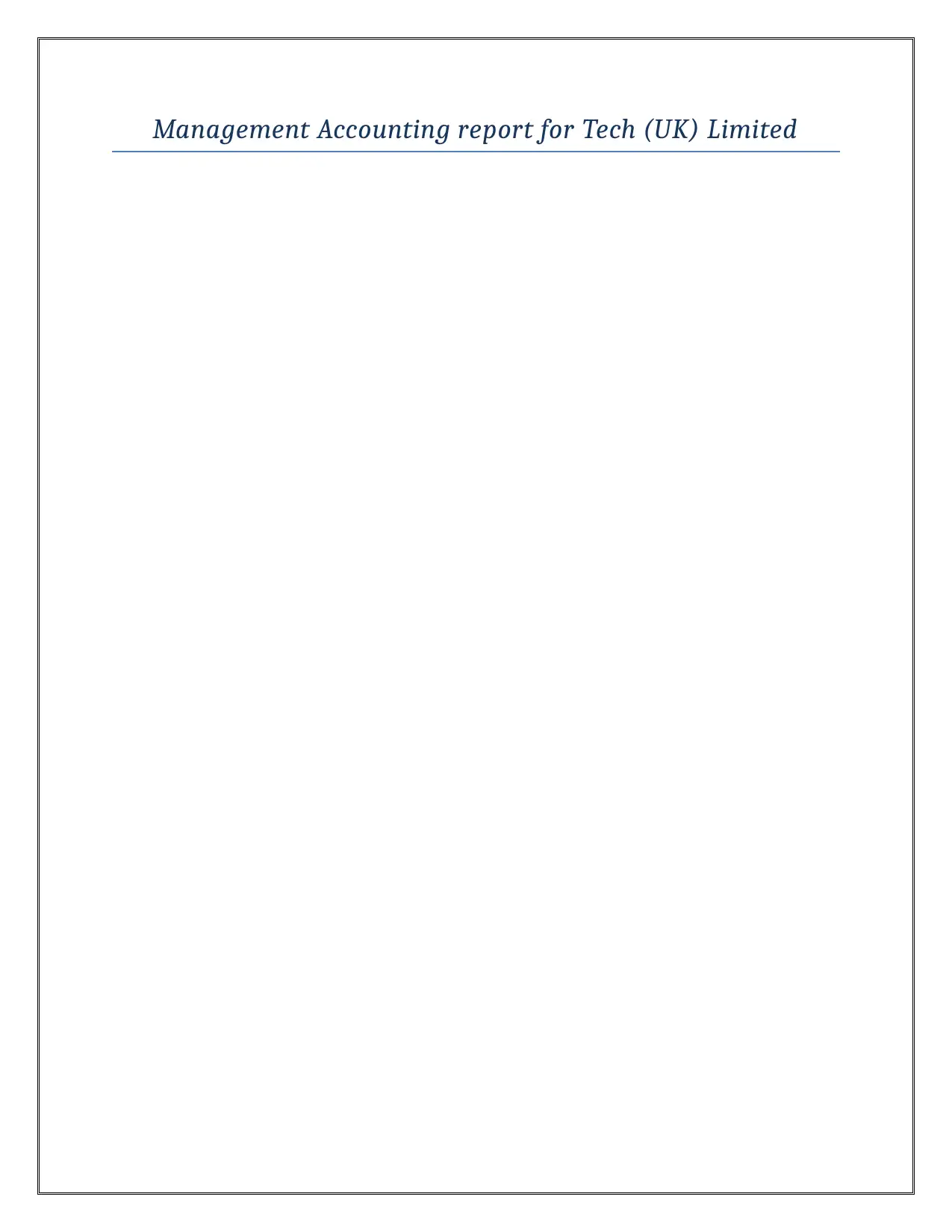
Management Accounting report for Tech (UK) Limited
Secure Best Marks with AI Grader
Need help grading? Try our AI Grader for instant feedback on your assignments.
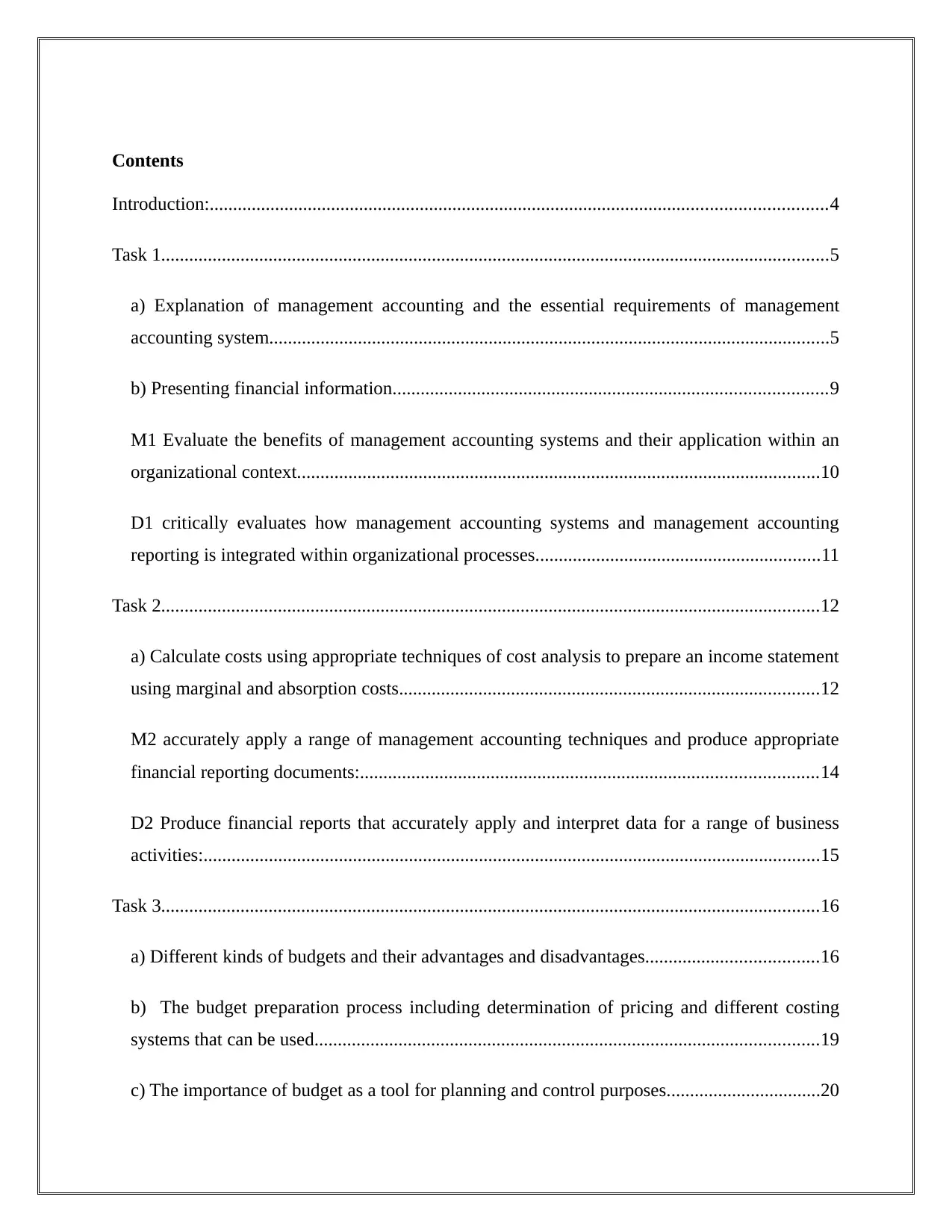
Contents
Introduction:....................................................................................................................................4
Task 1...............................................................................................................................................5
a) Explanation of management accounting and the essential requirements of management
accounting system........................................................................................................................5
b) Presenting financial information.............................................................................................9
M1 Evaluate the benefits of management accounting systems and their application within an
organizational context................................................................................................................10
D1 critically evaluates how management accounting systems and management accounting
reporting is integrated within organizational processes.............................................................11
Task 2.............................................................................................................................................12
a) Calculate costs using appropriate techniques of cost analysis to prepare an income statement
using marginal and absorption costs..........................................................................................12
M2 accurately apply a range of management accounting techniques and produce appropriate
financial reporting documents:..................................................................................................14
D2 Produce financial reports that accurately apply and interpret data for a range of business
activities:....................................................................................................................................15
Task 3.............................................................................................................................................16
a) Different kinds of budgets and their advantages and disadvantages.....................................16
b) The budget preparation process including determination of pricing and different costing
systems that can be used............................................................................................................19
c) The importance of budget as a tool for planning and control purposes.................................20
Introduction:....................................................................................................................................4
Task 1...............................................................................................................................................5
a) Explanation of management accounting and the essential requirements of management
accounting system........................................................................................................................5
b) Presenting financial information.............................................................................................9
M1 Evaluate the benefits of management accounting systems and their application within an
organizational context................................................................................................................10
D1 critically evaluates how management accounting systems and management accounting
reporting is integrated within organizational processes.............................................................11
Task 2.............................................................................................................................................12
a) Calculate costs using appropriate techniques of cost analysis to prepare an income statement
using marginal and absorption costs..........................................................................................12
M2 accurately apply a range of management accounting techniques and produce appropriate
financial reporting documents:..................................................................................................14
D2 Produce financial reports that accurately apply and interpret data for a range of business
activities:....................................................................................................................................15
Task 3.............................................................................................................................................16
a) Different kinds of budgets and their advantages and disadvantages.....................................16
b) The budget preparation process including determination of pricing and different costing
systems that can be used............................................................................................................19
c) The importance of budget as a tool for planning and control purposes.................................20
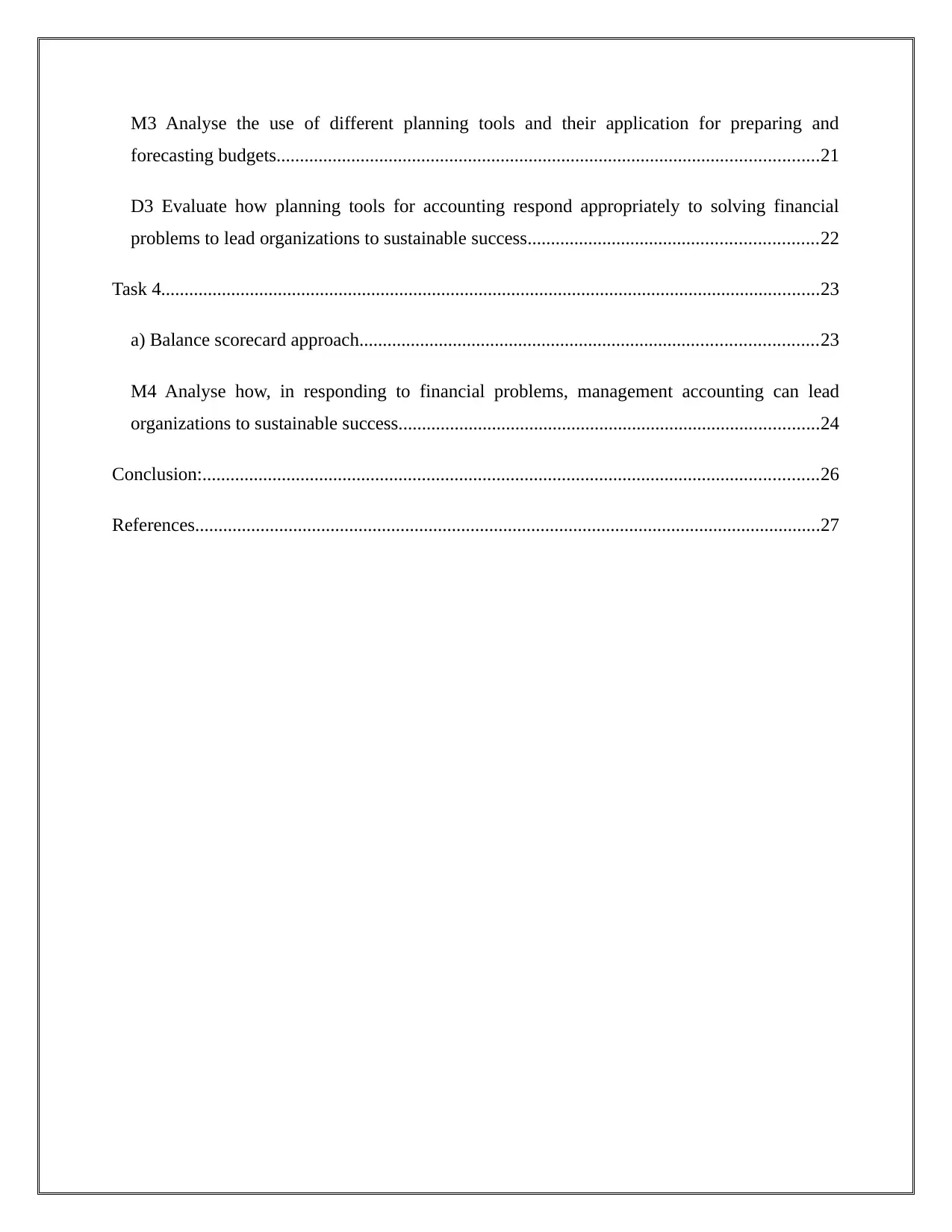
M3 Analyse the use of different planning tools and their application for preparing and
forecasting budgets....................................................................................................................21
D3 Evaluate how planning tools for accounting respond appropriately to solving financial
problems to lead organizations to sustainable success..............................................................22
Task 4.............................................................................................................................................23
a) Balance scorecard approach..................................................................................................23
M4 Analyse how, in responding to financial problems, management accounting can lead
organizations to sustainable success..........................................................................................24
Conclusion:....................................................................................................................................26
References......................................................................................................................................27
forecasting budgets....................................................................................................................21
D3 Evaluate how planning tools for accounting respond appropriately to solving financial
problems to lead organizations to sustainable success..............................................................22
Task 4.............................................................................................................................................23
a) Balance scorecard approach..................................................................................................23
M4 Analyse how, in responding to financial problems, management accounting can lead
organizations to sustainable success..........................................................................................24
Conclusion:....................................................................................................................................26
References......................................................................................................................................27
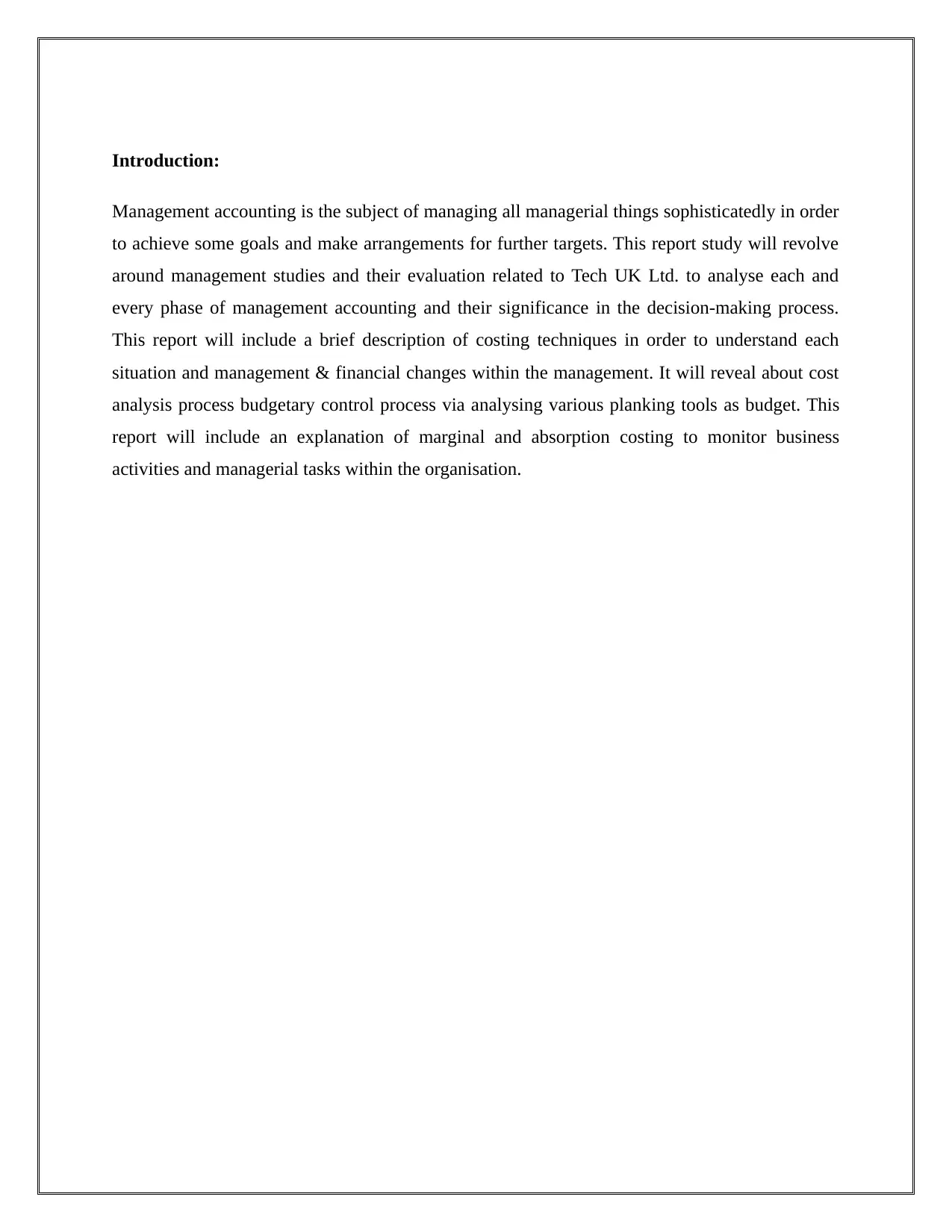
Introduction:
Management accounting is the subject of managing all managerial things sophisticatedly in order
to achieve some goals and make arrangements for further targets. This report study will revolve
around management studies and their evaluation related to Tech UK Ltd. to analyse each and
every phase of management accounting and their significance in the decision-making process.
This report will include a brief description of costing techniques in order to understand each
situation and management & financial changes within the management. It will reveal about cost
analysis process budgetary control process via analysing various planking tools as budget. This
report will include an explanation of marginal and absorption costing to monitor business
activities and managerial tasks within the organisation.
Management accounting is the subject of managing all managerial things sophisticatedly in order
to achieve some goals and make arrangements for further targets. This report study will revolve
around management studies and their evaluation related to Tech UK Ltd. to analyse each and
every phase of management accounting and their significance in the decision-making process.
This report will include a brief description of costing techniques in order to understand each
situation and management & financial changes within the management. It will reveal about cost
analysis process budgetary control process via analysing various planking tools as budget. This
report will include an explanation of marginal and absorption costing to monitor business
activities and managerial tasks within the organisation.
Secure Best Marks with AI Grader
Need help grading? Try our AI Grader for instant feedback on your assignments.
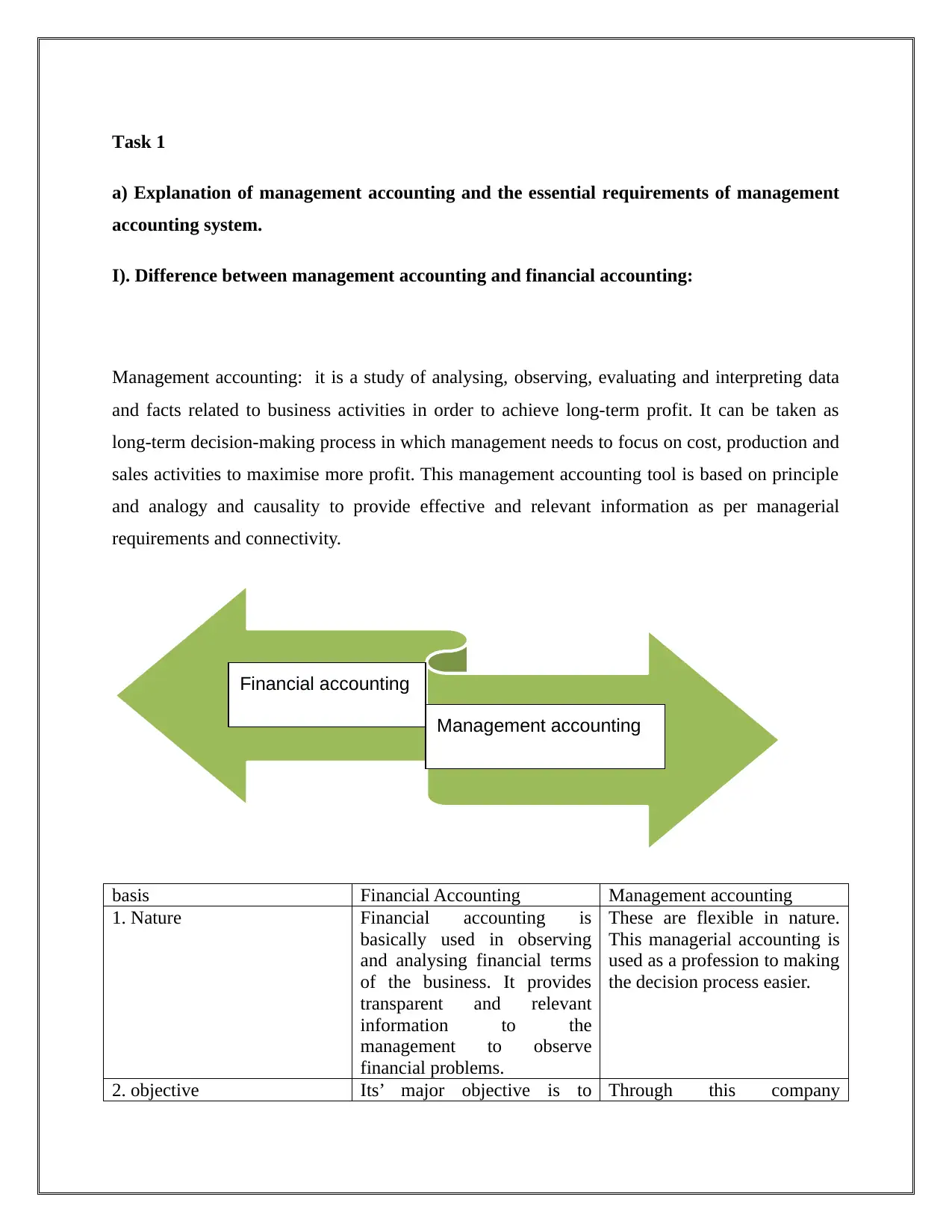
Task 1
a) Explanation of management accounting and the essential requirements of management
accounting system.
I). Difference between management accounting and financial accounting:
Management accounting: it is a study of analysing, observing, evaluating and interpreting data
and facts related to business activities in order to achieve long-term profit. It can be taken as
long-term decision-making process in which management needs to focus on cost, production and
sales activities to maximise more profit. This management accounting tool is based on principle
and analogy and causality to provide effective and relevant information as per managerial
requirements and connectivity.
basis Financial Accounting Management accounting
1. Nature Financial accounting is
basically used in observing
and analysing financial terms
of the business. It provides
transparent and relevant
information to the
management to observe
financial problems.
These are flexible in nature.
This managerial accounting is
used as a profession to making
the decision process easier.
2. objective Its’ major objective is to Through this company
Financial accounting
Management accounting
a) Explanation of management accounting and the essential requirements of management
accounting system.
I). Difference between management accounting and financial accounting:
Management accounting: it is a study of analysing, observing, evaluating and interpreting data
and facts related to business activities in order to achieve long-term profit. It can be taken as
long-term decision-making process in which management needs to focus on cost, production and
sales activities to maximise more profit. This management accounting tool is based on principle
and analogy and causality to provide effective and relevant information as per managerial
requirements and connectivity.
basis Financial Accounting Management accounting
1. Nature Financial accounting is
basically used in observing
and analysing financial terms
of the business. It provides
transparent and relevant
information to the
management to observe
financial problems.
These are flexible in nature.
This managerial accounting is
used as a profession to making
the decision process easier.
2. objective Its’ major objective is to Through this company
Financial accounting
Management accounting
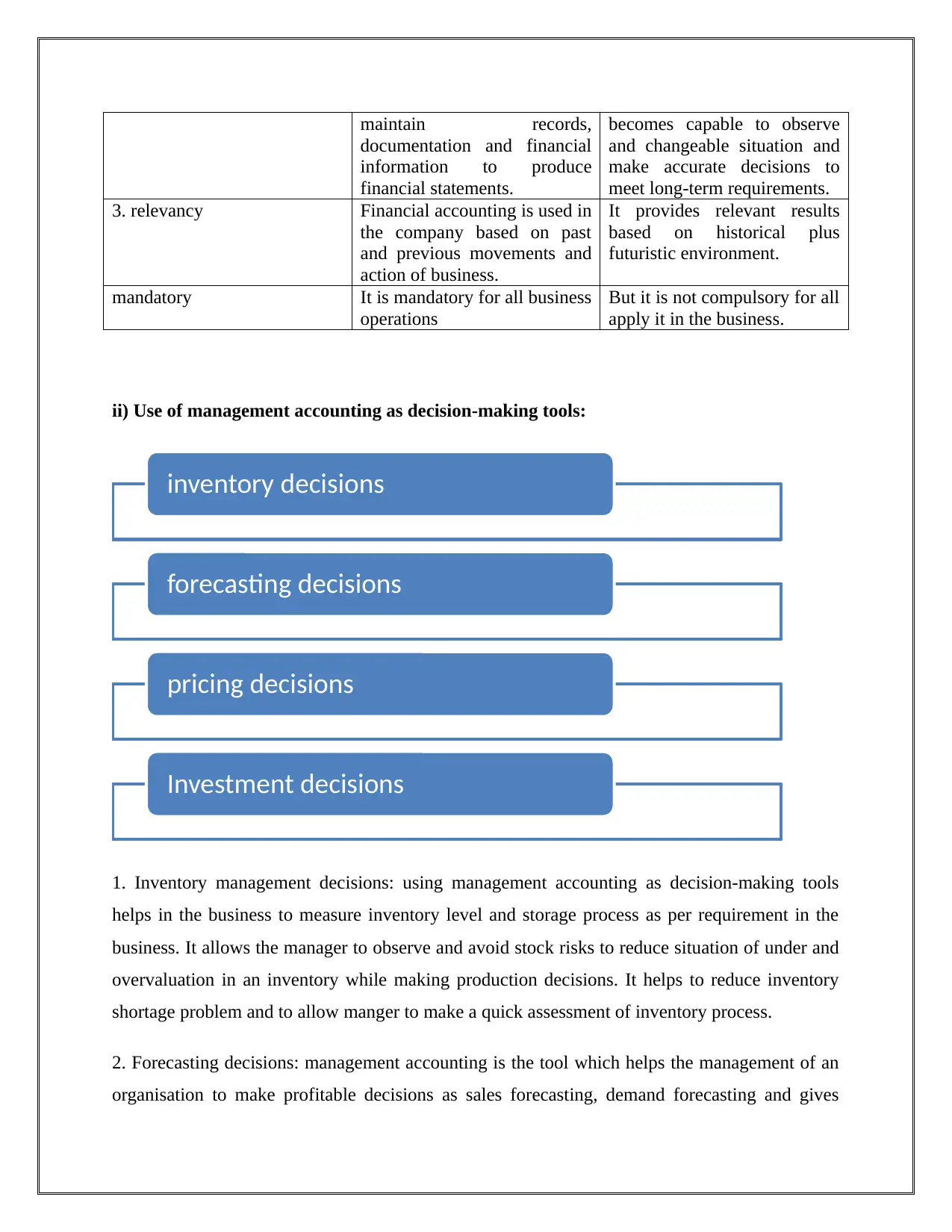
maintain records,
documentation and financial
information to produce
financial statements.
becomes capable to observe
and changeable situation and
make accurate decisions to
meet long-term requirements.
3. relevancy Financial accounting is used in
the company based on past
and previous movements and
action of business.
It provides relevant results
based on historical plus
futuristic environment.
mandatory It is mandatory for all business
operations
But it is not compulsory for all
apply it in the business.
ii) Use of management accounting as decision-making tools:
1. Inventory management decisions: using management accounting as decision-making tools
helps in the business to measure inventory level and storage process as per requirement in the
business. It allows the manager to observe and avoid stock risks to reduce situation of under and
overvaluation in an inventory while making production decisions. It helps to reduce inventory
shortage problem and to allow manger to make a quick assessment of inventory process.
2. Forecasting decisions: management accounting is the tool which helps the management of an
organisation to make profitable decisions as sales forecasting, demand forecasting and gives
inventory decisions
forecasting decisions
pricing decisions
Investment decisions
documentation and financial
information to produce
financial statements.
becomes capable to observe
and changeable situation and
make accurate decisions to
meet long-term requirements.
3. relevancy Financial accounting is used in
the company based on past
and previous movements and
action of business.
It provides relevant results
based on historical plus
futuristic environment.
mandatory It is mandatory for all business
operations
But it is not compulsory for all
apply it in the business.
ii) Use of management accounting as decision-making tools:
1. Inventory management decisions: using management accounting as decision-making tools
helps in the business to measure inventory level and storage process as per requirement in the
business. It allows the manager to observe and avoid stock risks to reduce situation of under and
overvaluation in an inventory while making production decisions. It helps to reduce inventory
shortage problem and to allow manger to make a quick assessment of inventory process.
2. Forecasting decisions: management accounting is the tool which helps the management of an
organisation to make profitable decisions as sales forecasting, demand forecasting and gives
inventory decisions
forecasting decisions
pricing decisions
Investment decisions
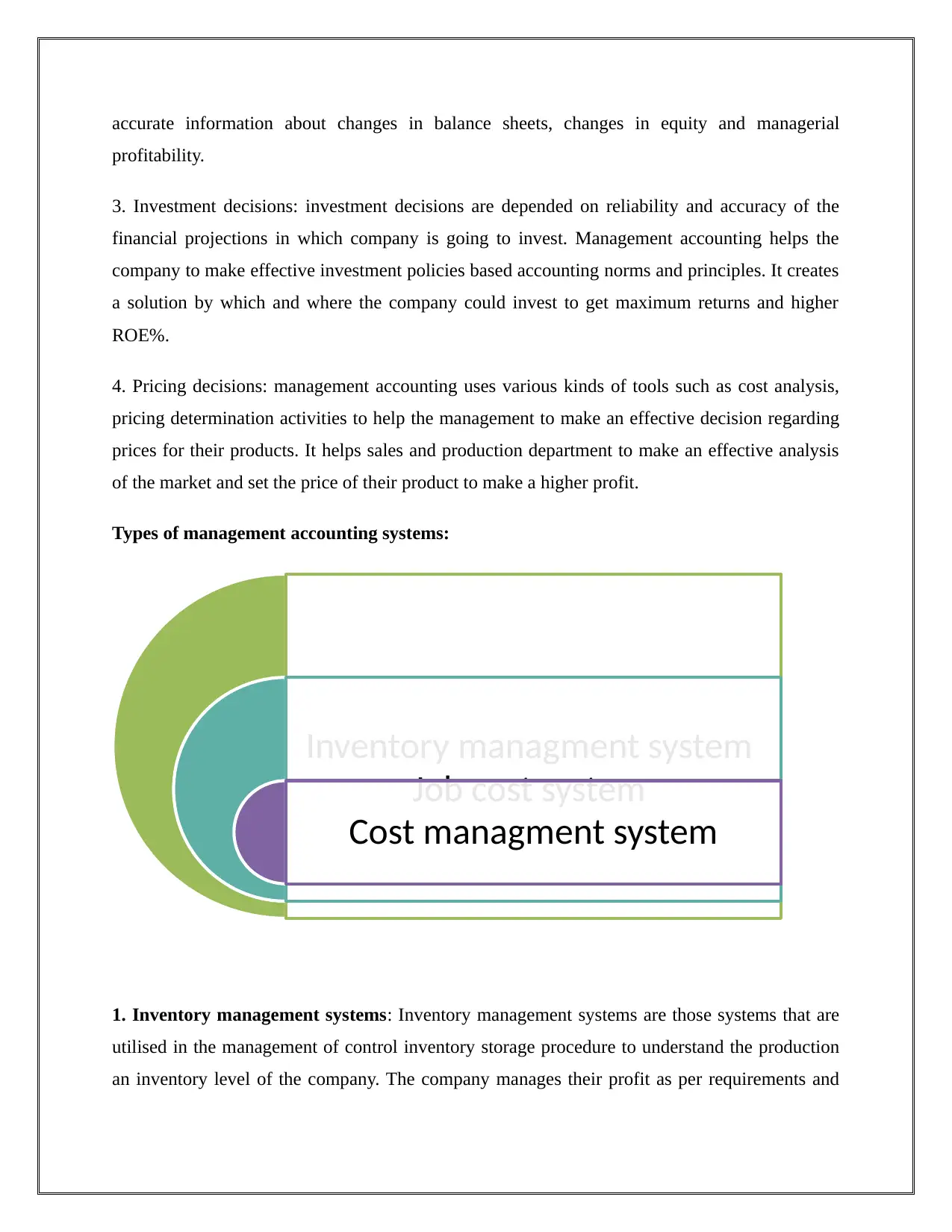
accurate information about changes in balance sheets, changes in equity and managerial
profitability.
3. Investment decisions: investment decisions are depended on reliability and accuracy of the
financial projections in which company is going to invest. Management accounting helps the
company to make effective investment policies based accounting norms and principles. It creates
a solution by which and where the company could invest to get maximum returns and higher
ROE%.
4. Pricing decisions: management accounting uses various kinds of tools such as cost analysis,
pricing determination activities to help the management to make an effective decision regarding
prices for their products. It helps sales and production department to make an effective analysis
of the market and set the price of their product to make a higher profit.
Types of management accounting systems:
1. Inventory management systems: Inventory management systems are those systems that are
utilised in the management of control inventory storage procedure to understand the production
an inventory level of the company. The company manages their profit as per requirements and
Inventory managment system
Job cost system
Cost managment system
profitability.
3. Investment decisions: investment decisions are depended on reliability and accuracy of the
financial projections in which company is going to invest. Management accounting helps the
company to make effective investment policies based accounting norms and principles. It creates
a solution by which and where the company could invest to get maximum returns and higher
ROE%.
4. Pricing decisions: management accounting uses various kinds of tools such as cost analysis,
pricing determination activities to help the management to make an effective decision regarding
prices for their products. It helps sales and production department to make an effective analysis
of the market and set the price of their product to make a higher profit.
Types of management accounting systems:
1. Inventory management systems: Inventory management systems are those systems that are
utilised in the management of control inventory storage procedure to understand the production
an inventory level of the company. The company manages their profit as per requirements and
Inventory managment system
Job cost system
Cost managment system
Paraphrase This Document
Need a fresh take? Get an instant paraphrase of this document with our AI Paraphraser
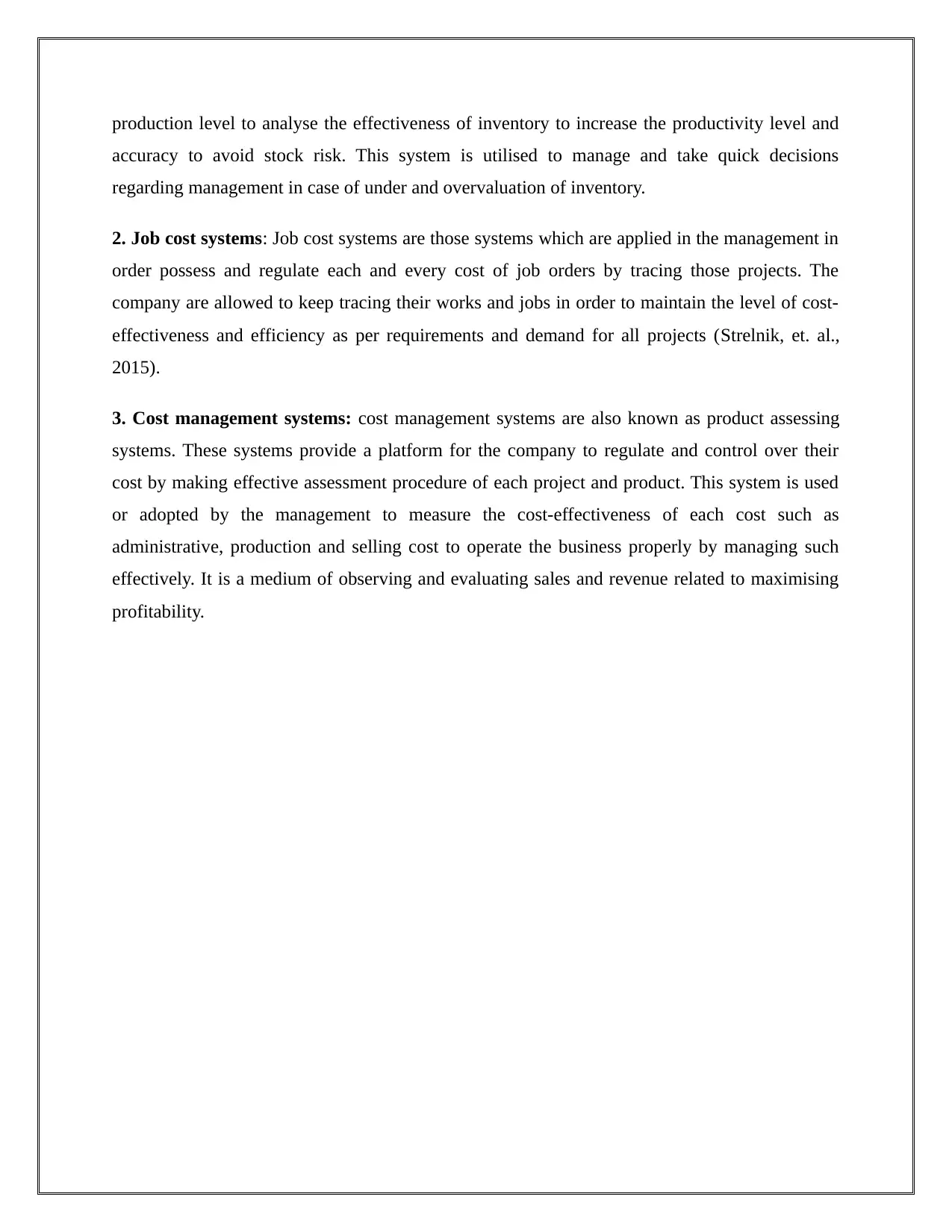
production level to analyse the effectiveness of inventory to increase the productivity level and
accuracy to avoid stock risk. This system is utilised to manage and take quick decisions
regarding management in case of under and overvaluation of inventory.
2. Job cost systems: Job cost systems are those systems which are applied in the management in
order possess and regulate each and every cost of job orders by tracing those projects. The
company are allowed to keep tracing their works and jobs in order to maintain the level of cost-
effectiveness and efficiency as per requirements and demand for all projects (Strelnik, et. al.,
2015).
3. Cost management systems: cost management systems are also known as product assessing
systems. These systems provide a platform for the company to regulate and control over their
cost by making effective assessment procedure of each project and product. This system is used
or adopted by the management to measure the cost-effectiveness of each cost such as
administrative, production and selling cost to operate the business properly by managing such
effectively. It is a medium of observing and evaluating sales and revenue related to maximising
profitability.
accuracy to avoid stock risk. This system is utilised to manage and take quick decisions
regarding management in case of under and overvaluation of inventory.
2. Job cost systems: Job cost systems are those systems which are applied in the management in
order possess and regulate each and every cost of job orders by tracing those projects. The
company are allowed to keep tracing their works and jobs in order to maintain the level of cost-
effectiveness and efficiency as per requirements and demand for all projects (Strelnik, et. al.,
2015).
3. Cost management systems: cost management systems are also known as product assessing
systems. These systems provide a platform for the company to regulate and control over their
cost by making effective assessment procedure of each project and product. This system is used
or adopted by the management to measure the cost-effectiveness of each cost such as
administrative, production and selling cost to operate the business properly by managing such
effectively. It is a medium of observing and evaluating sales and revenue related to maximising
profitability.
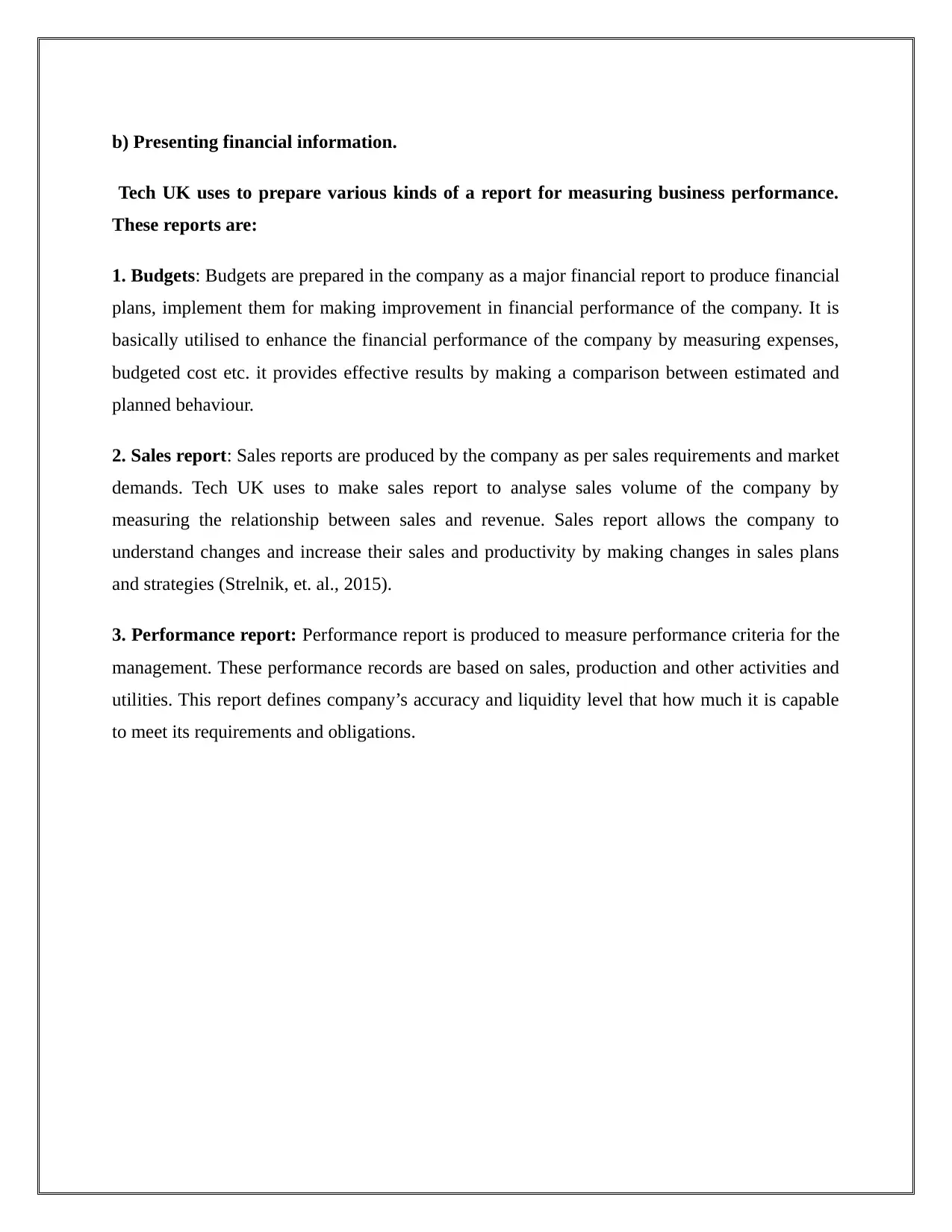
b) Presenting financial information.
Tech UK uses to prepare various kinds of a report for measuring business performance.
These reports are:
1. Budgets: Budgets are prepared in the company as a major financial report to produce financial
plans, implement them for making improvement in financial performance of the company. It is
basically utilised to enhance the financial performance of the company by measuring expenses,
budgeted cost etc. it provides effective results by making a comparison between estimated and
planned behaviour.
2. Sales report: Sales reports are produced by the company as per sales requirements and market
demands. Tech UK uses to make sales report to analyse sales volume of the company by
measuring the relationship between sales and revenue. Sales report allows the company to
understand changes and increase their sales and productivity by making changes in sales plans
and strategies (Strelnik, et. al., 2015).
3. Performance report: Performance report is produced to measure performance criteria for the
management. These performance records are based on sales, production and other activities and
utilities. This report defines company’s accuracy and liquidity level that how much it is capable
to meet its requirements and obligations.
Tech UK uses to prepare various kinds of a report for measuring business performance.
These reports are:
1. Budgets: Budgets are prepared in the company as a major financial report to produce financial
plans, implement them for making improvement in financial performance of the company. It is
basically utilised to enhance the financial performance of the company by measuring expenses,
budgeted cost etc. it provides effective results by making a comparison between estimated and
planned behaviour.
2. Sales report: Sales reports are produced by the company as per sales requirements and market
demands. Tech UK uses to make sales report to analyse sales volume of the company by
measuring the relationship between sales and revenue. Sales report allows the company to
understand changes and increase their sales and productivity by making changes in sales plans
and strategies (Strelnik, et. al., 2015).
3. Performance report: Performance report is produced to measure performance criteria for the
management. These performance records are based on sales, production and other activities and
utilities. This report defines company’s accuracy and liquidity level that how much it is capable
to meet its requirements and obligations.
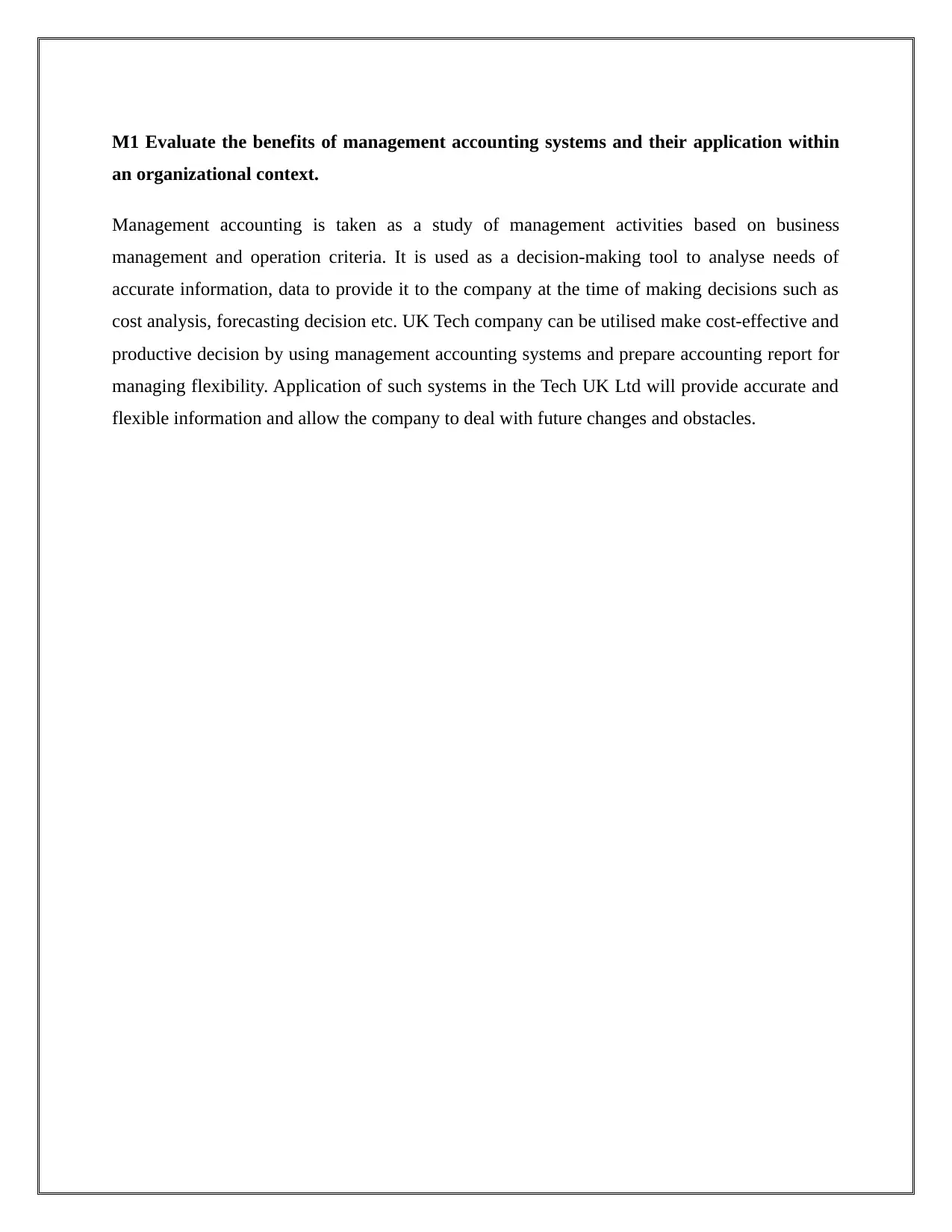
M1 Evaluate the benefits of management accounting systems and their application within
an organizational context.
Management accounting is taken as a study of management activities based on business
management and operation criteria. It is used as a decision-making tool to analyse needs of
accurate information, data to provide it to the company at the time of making decisions such as
cost analysis, forecasting decision etc. UK Tech company can be utilised make cost-effective and
productive decision by using management accounting systems and prepare accounting report for
managing flexibility. Application of such systems in the Tech UK Ltd will provide accurate and
flexible information and allow the company to deal with future changes and obstacles.
an organizational context.
Management accounting is taken as a study of management activities based on business
management and operation criteria. It is used as a decision-making tool to analyse needs of
accurate information, data to provide it to the company at the time of making decisions such as
cost analysis, forecasting decision etc. UK Tech company can be utilised make cost-effective and
productive decision by using management accounting systems and prepare accounting report for
managing flexibility. Application of such systems in the Tech UK Ltd will provide accurate and
flexible information and allow the company to deal with future changes and obstacles.
Secure Best Marks with AI Grader
Need help grading? Try our AI Grader for instant feedback on your assignments.
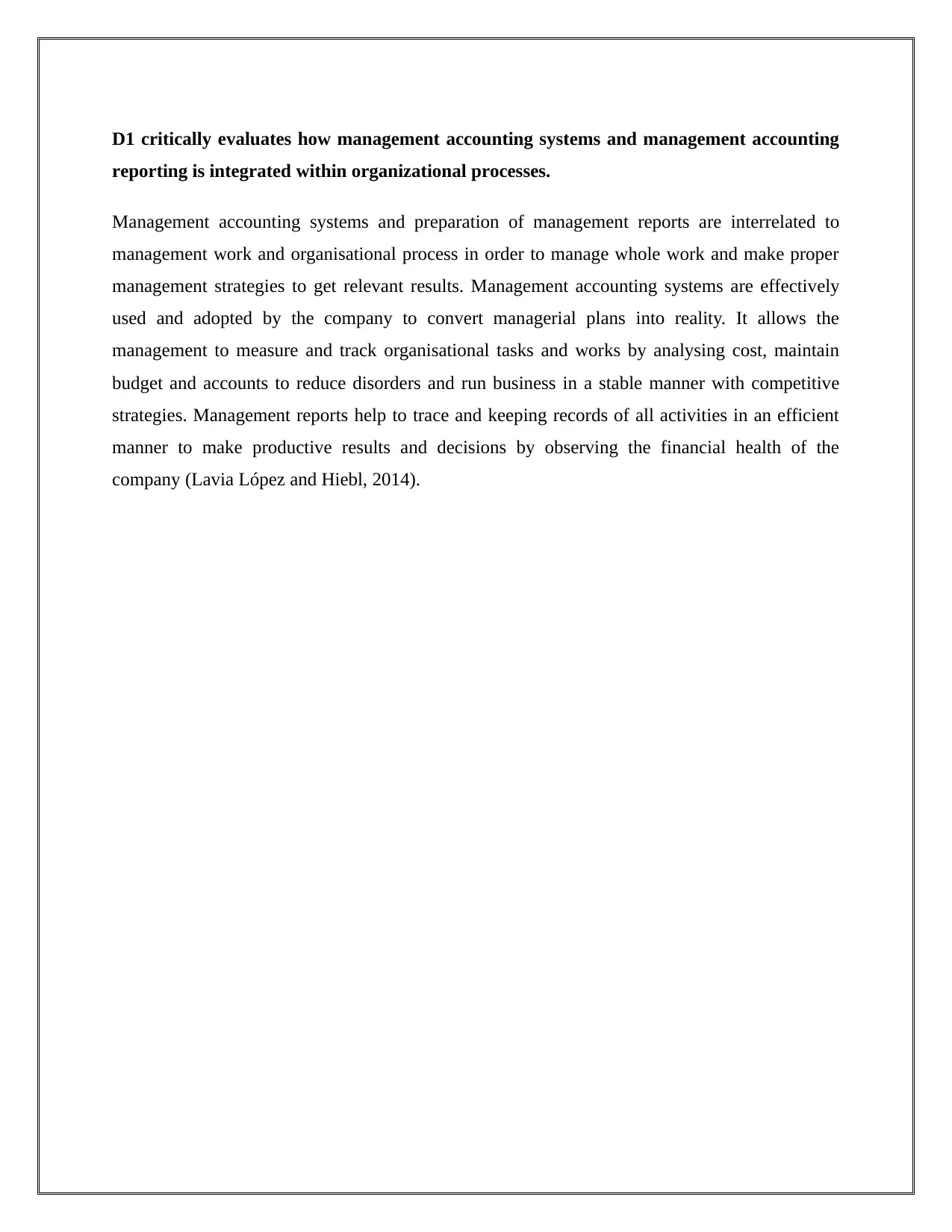
D1 critically evaluates how management accounting systems and management accounting
reporting is integrated within organizational processes.
Management accounting systems and preparation of management reports are interrelated to
management work and organisational process in order to manage whole work and make proper
management strategies to get relevant results. Management accounting systems are effectively
used and adopted by the company to convert managerial plans into reality. It allows the
management to measure and track organisational tasks and works by analysing cost, maintain
budget and accounts to reduce disorders and run business in a stable manner with competitive
strategies. Management reports help to trace and keeping records of all activities in an efficient
manner to make productive results and decisions by observing the financial health of the
company (Lavia López and Hiebl, 2014).
reporting is integrated within organizational processes.
Management accounting systems and preparation of management reports are interrelated to
management work and organisational process in order to manage whole work and make proper
management strategies to get relevant results. Management accounting systems are effectively
used and adopted by the company to convert managerial plans into reality. It allows the
management to measure and track organisational tasks and works by analysing cost, maintain
budget and accounts to reduce disorders and run business in a stable manner with competitive
strategies. Management reports help to trace and keeping records of all activities in an efficient
manner to make productive results and decisions by observing the financial health of the
company (Lavia López and Hiebl, 2014).
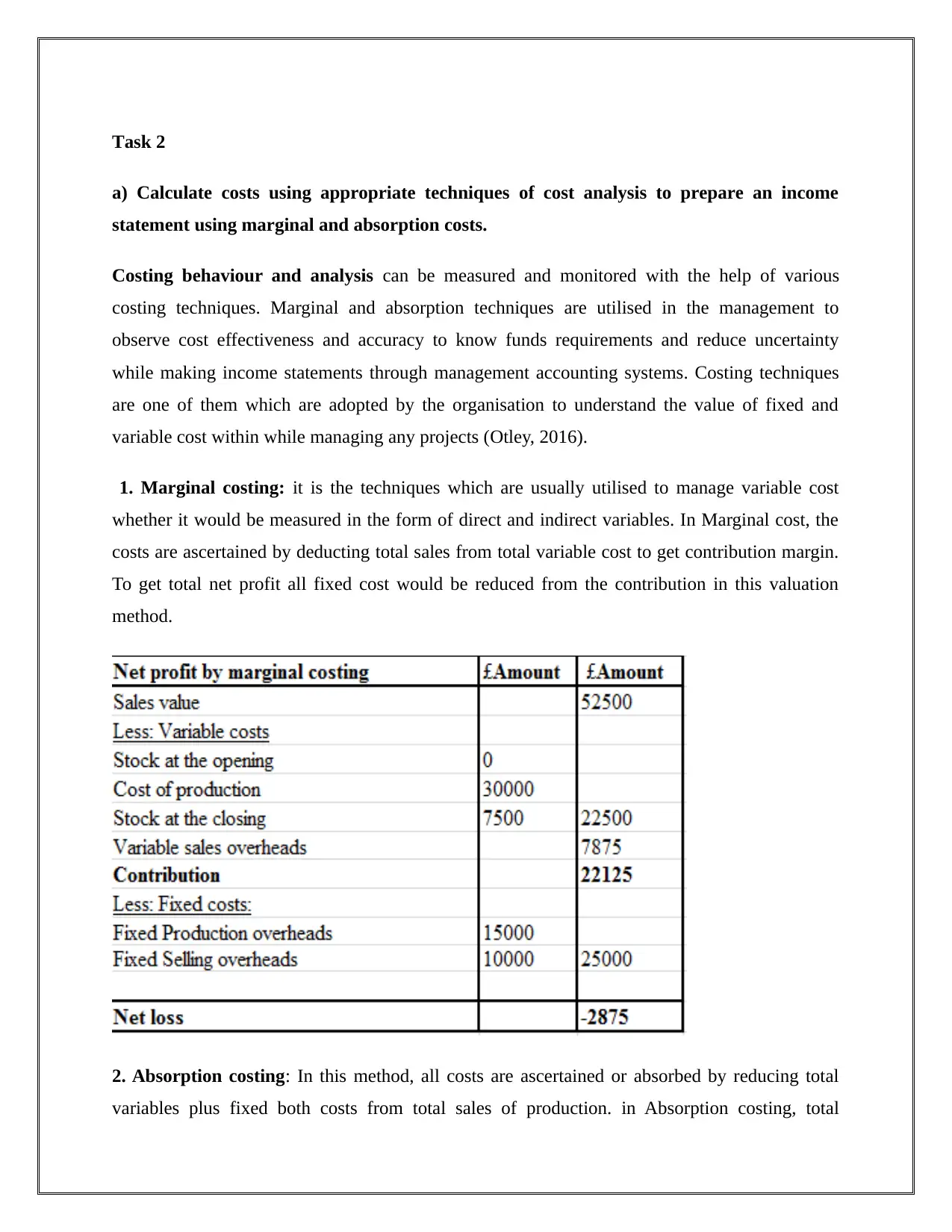
Task 2
a) Calculate costs using appropriate techniques of cost analysis to prepare an income
statement using marginal and absorption costs.
Costing behaviour and analysis can be measured and monitored with the help of various
costing techniques. Marginal and absorption techniques are utilised in the management to
observe cost effectiveness and accuracy to know funds requirements and reduce uncertainty
while making income statements through management accounting systems. Costing techniques
are one of them which are adopted by the organisation to understand the value of fixed and
variable cost within while managing any projects (Otley, 2016).
1. Marginal costing: it is the techniques which are usually utilised to manage variable cost
whether it would be measured in the form of direct and indirect variables. In Marginal cost, the
costs are ascertained by deducting total sales from total variable cost to get contribution margin.
To get total net profit all fixed cost would be reduced from the contribution in this valuation
method.
2. Absorption costing: In this method, all costs are ascertained or absorbed by reducing total
variables plus fixed both costs from total sales of production. in Absorption costing, total
a) Calculate costs using appropriate techniques of cost analysis to prepare an income
statement using marginal and absorption costs.
Costing behaviour and analysis can be measured and monitored with the help of various
costing techniques. Marginal and absorption techniques are utilised in the management to
observe cost effectiveness and accuracy to know funds requirements and reduce uncertainty
while making income statements through management accounting systems. Costing techniques
are one of them which are adopted by the organisation to understand the value of fixed and
variable cost within while managing any projects (Otley, 2016).
1. Marginal costing: it is the techniques which are usually utilised to manage variable cost
whether it would be measured in the form of direct and indirect variables. In Marginal cost, the
costs are ascertained by deducting total sales from total variable cost to get contribution margin.
To get total net profit all fixed cost would be reduced from the contribution in this valuation
method.
2. Absorption costing: In this method, all costs are ascertained or absorbed by reducing total
variables plus fixed both costs from total sales of production. in Absorption costing, total
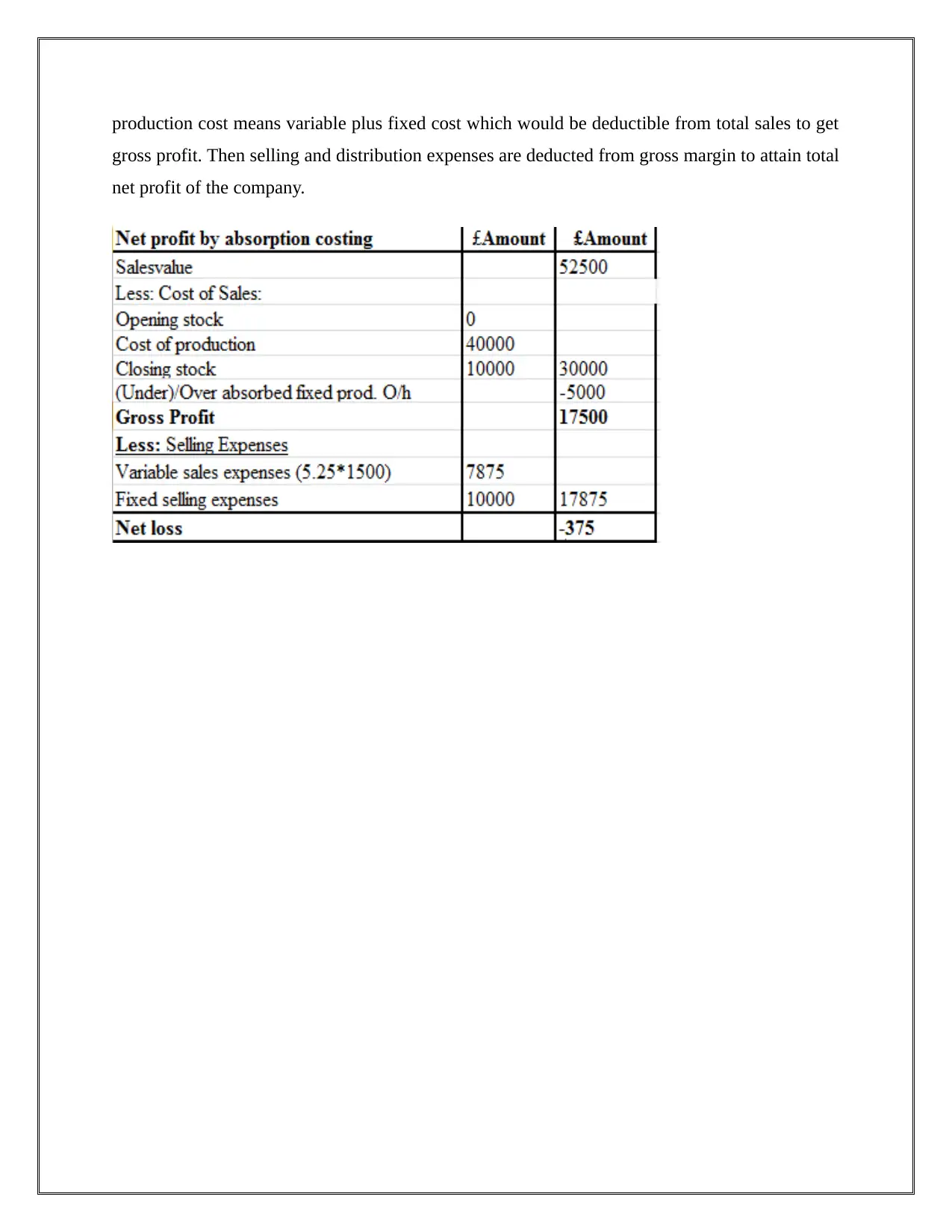
production cost means variable plus fixed cost which would be deductible from total sales to get
gross profit. Then selling and distribution expenses are deducted from gross margin to attain total
net profit of the company.
gross profit. Then selling and distribution expenses are deducted from gross margin to attain total
net profit of the company.
Paraphrase This Document
Need a fresh take? Get an instant paraphrase of this document with our AI Paraphraser
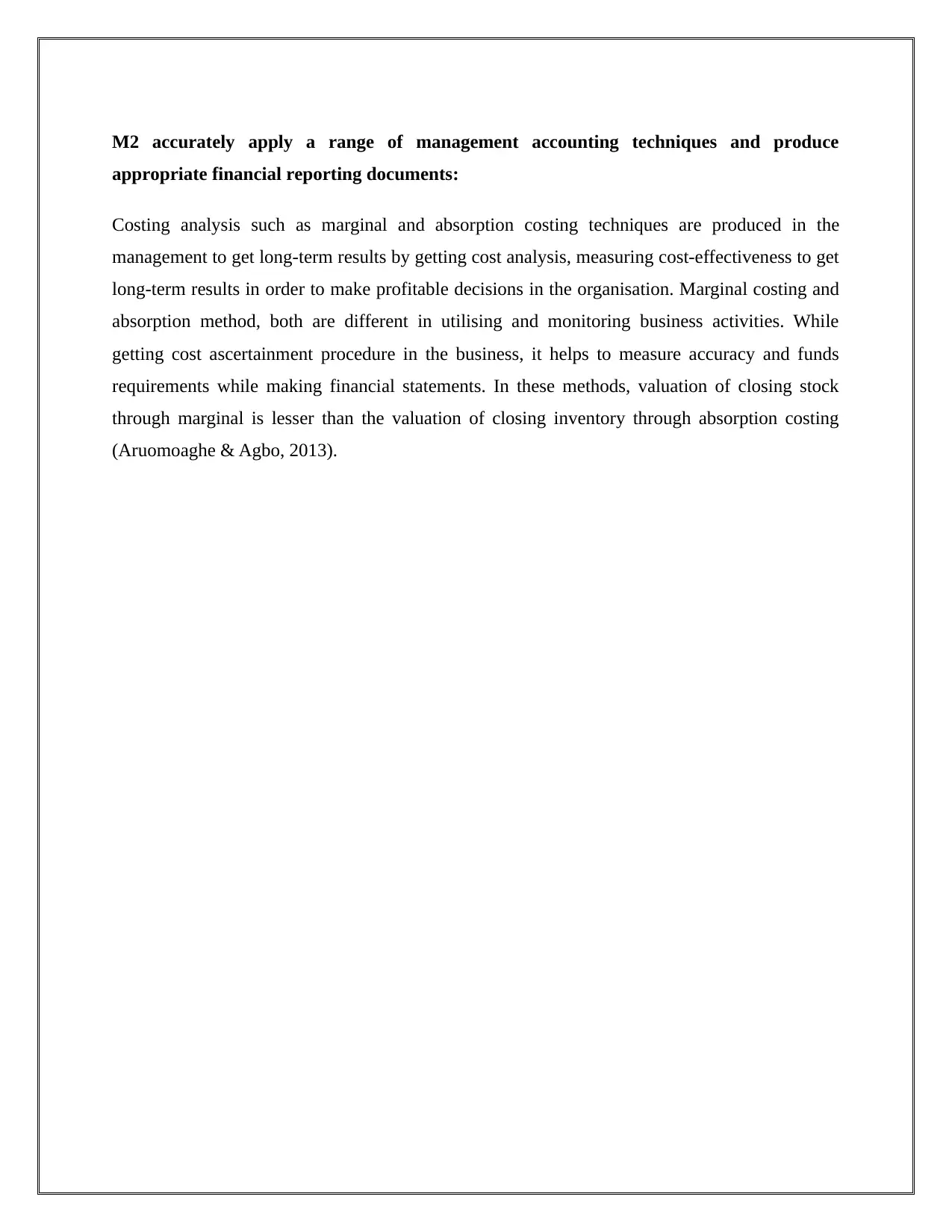
M2 accurately apply a range of management accounting techniques and produce
appropriate financial reporting documents:
Costing analysis such as marginal and absorption costing techniques are produced in the
management to get long-term results by getting cost analysis, measuring cost-effectiveness to get
long-term results in order to make profitable decisions in the organisation. Marginal costing and
absorption method, both are different in utilising and monitoring business activities. While
getting cost ascertainment procedure in the business, it helps to measure accuracy and funds
requirements while making financial statements. In these methods, valuation of closing stock
through marginal is lesser than the valuation of closing inventory through absorption costing
(Aruomoaghe & Agbo, 2013).
appropriate financial reporting documents:
Costing analysis such as marginal and absorption costing techniques are produced in the
management to get long-term results by getting cost analysis, measuring cost-effectiveness to get
long-term results in order to make profitable decisions in the organisation. Marginal costing and
absorption method, both are different in utilising and monitoring business activities. While
getting cost ascertainment procedure in the business, it helps to measure accuracy and funds
requirements while making financial statements. In these methods, valuation of closing stock
through marginal is lesser than the valuation of closing inventory through absorption costing
(Aruomoaghe & Agbo, 2013).
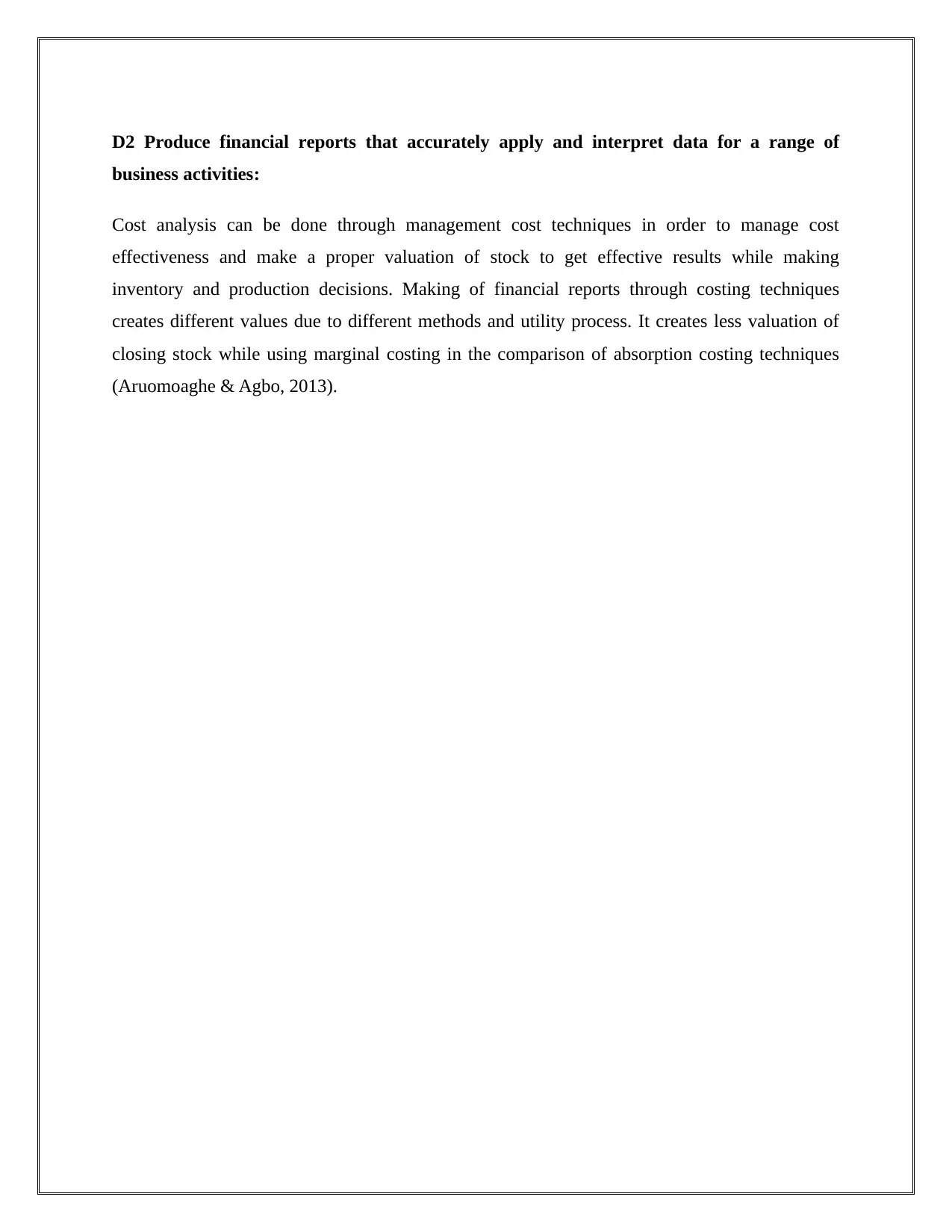
D2 Produce financial reports that accurately apply and interpret data for a range of
business activities:
Cost analysis can be done through management cost techniques in order to manage cost
effectiveness and make a proper valuation of stock to get effective results while making
inventory and production decisions. Making of financial reports through costing techniques
creates different values due to different methods and utility process. It creates less valuation of
closing stock while using marginal costing in the comparison of absorption costing techniques
(Aruomoaghe & Agbo, 2013).
business activities:
Cost analysis can be done through management cost techniques in order to manage cost
effectiveness and make a proper valuation of stock to get effective results while making
inventory and production decisions. Making of financial reports through costing techniques
creates different values due to different methods and utility process. It creates less valuation of
closing stock while using marginal costing in the comparison of absorption costing techniques
(Aruomoaghe & Agbo, 2013).
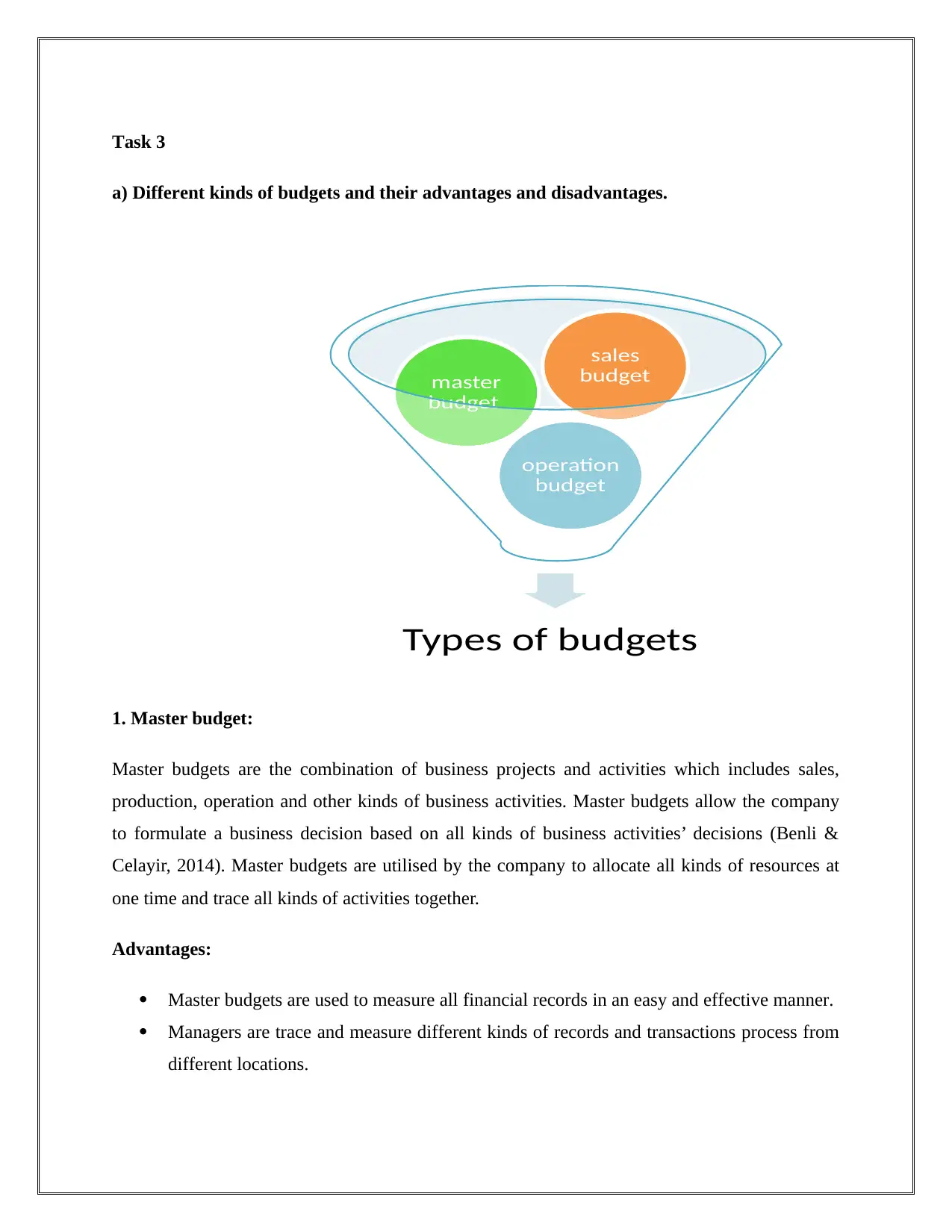
Task 3
a) Different kinds of budgets and their advantages and disadvantages.
1. Master budget:
Master budgets are the combination of business projects and activities which includes sales,
production, operation and other kinds of business activities. Master budgets allow the company
to formulate a business decision based on all kinds of business activities’ decisions (Benli &
Celayir, 2014). Master budgets are utilised by the company to allocate all kinds of resources at
one time and trace all kinds of activities together.
Advantages:
Master budgets are used to measure all financial records in an easy and effective manner.
Managers are trace and measure different kinds of records and transactions process from
different locations.
Types of budgets
operation
budget
master
budget
sales
budget
a) Different kinds of budgets and their advantages and disadvantages.
1. Master budget:
Master budgets are the combination of business projects and activities which includes sales,
production, operation and other kinds of business activities. Master budgets allow the company
to formulate a business decision based on all kinds of business activities’ decisions (Benli &
Celayir, 2014). Master budgets are utilised by the company to allocate all kinds of resources at
one time and trace all kinds of activities together.
Advantages:
Master budgets are used to measure all financial records in an easy and effective manner.
Managers are trace and measure different kinds of records and transactions process from
different locations.
Types of budgets
operation
budget
master
budget
sales
budget
Secure Best Marks with AI Grader
Need help grading? Try our AI Grader for instant feedback on your assignments.
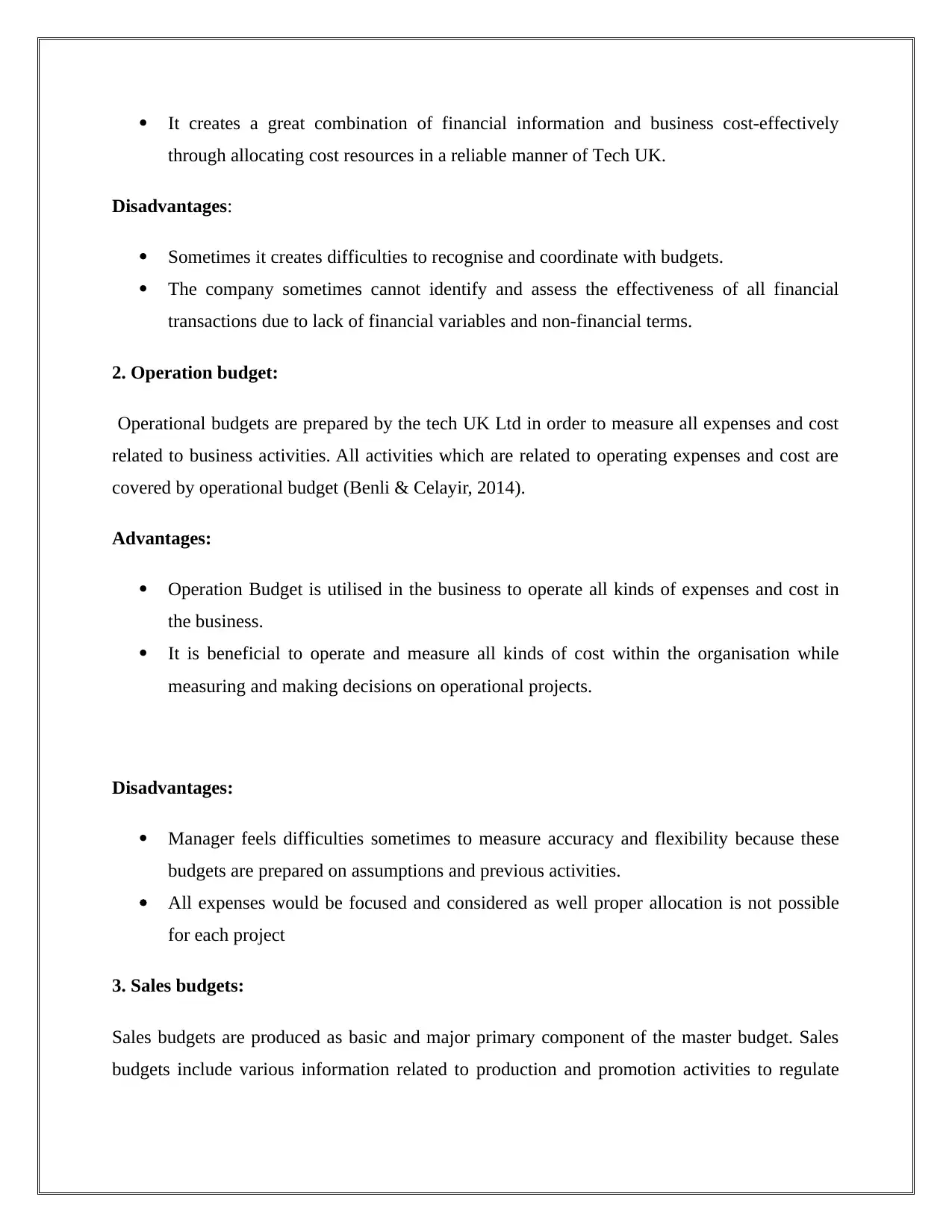
It creates a great combination of financial information and business cost-effectively
through allocating cost resources in a reliable manner of Tech UK.
Disadvantages:
Sometimes it creates difficulties to recognise and coordinate with budgets.
The company sometimes cannot identify and assess the effectiveness of all financial
transactions due to lack of financial variables and non-financial terms.
2. Operation budget:
Operational budgets are prepared by the tech UK Ltd in order to measure all expenses and cost
related to business activities. All activities which are related to operating expenses and cost are
covered by operational budget (Benli & Celayir, 2014).
Advantages:
Operation Budget is utilised in the business to operate all kinds of expenses and cost in
the business.
It is beneficial to operate and measure all kinds of cost within the organisation while
measuring and making decisions on operational projects.
Disadvantages:
Manager feels difficulties sometimes to measure accuracy and flexibility because these
budgets are prepared on assumptions and previous activities.
All expenses would be focused and considered as well proper allocation is not possible
for each project
3. Sales budgets:
Sales budgets are produced as basic and major primary component of the master budget. Sales
budgets include various information related to production and promotion activities to regulate
through allocating cost resources in a reliable manner of Tech UK.
Disadvantages:
Sometimes it creates difficulties to recognise and coordinate with budgets.
The company sometimes cannot identify and assess the effectiveness of all financial
transactions due to lack of financial variables and non-financial terms.
2. Operation budget:
Operational budgets are prepared by the tech UK Ltd in order to measure all expenses and cost
related to business activities. All activities which are related to operating expenses and cost are
covered by operational budget (Benli & Celayir, 2014).
Advantages:
Operation Budget is utilised in the business to operate all kinds of expenses and cost in
the business.
It is beneficial to operate and measure all kinds of cost within the organisation while
measuring and making decisions on operational projects.
Disadvantages:
Manager feels difficulties sometimes to measure accuracy and flexibility because these
budgets are prepared on assumptions and previous activities.
All expenses would be focused and considered as well proper allocation is not possible
for each project
3. Sales budgets:
Sales budgets are produced as basic and major primary component of the master budget. Sales
budgets include various information related to production and promotion activities to regulate
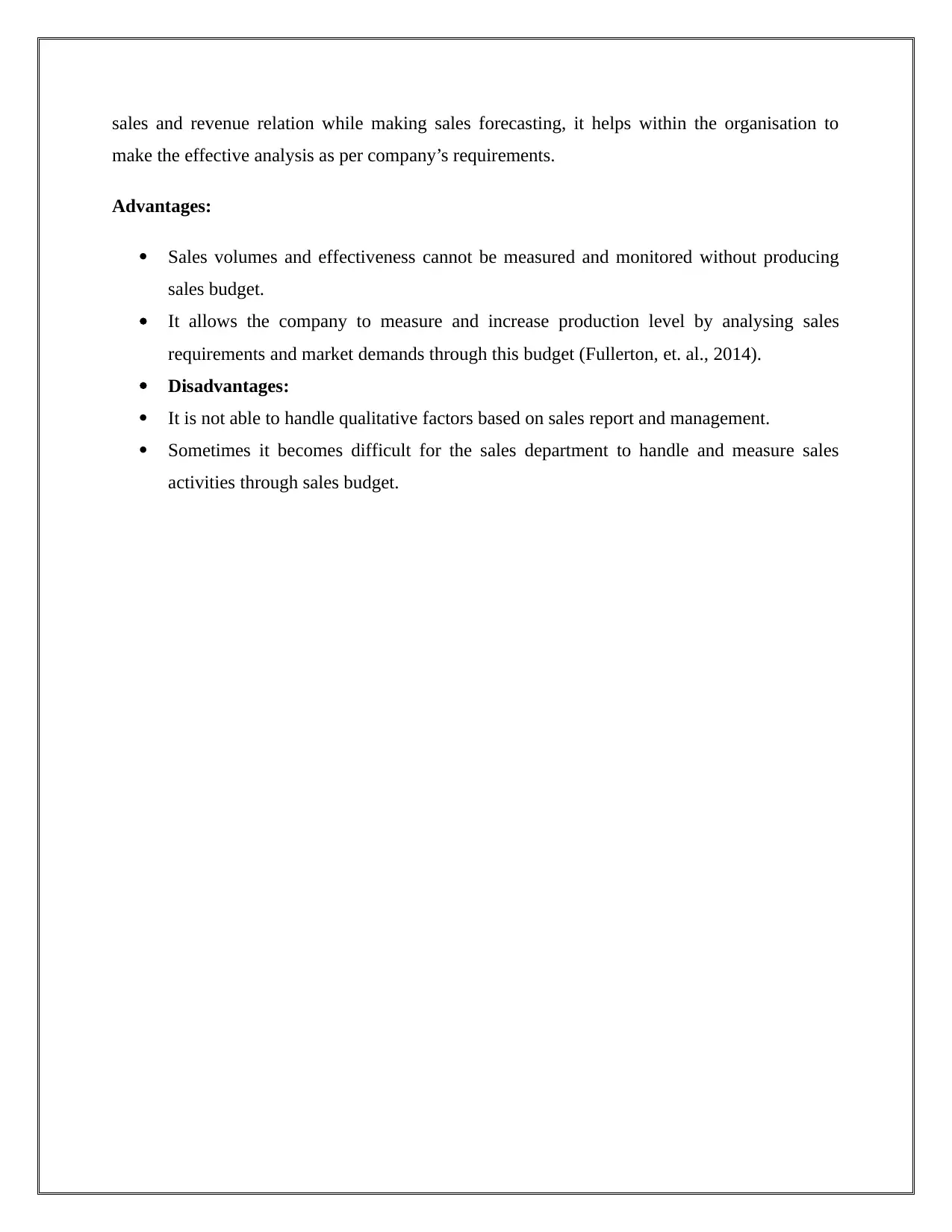
sales and revenue relation while making sales forecasting, it helps within the organisation to
make the effective analysis as per company’s requirements.
Advantages:
Sales volumes and effectiveness cannot be measured and monitored without producing
sales budget.
It allows the company to measure and increase production level by analysing sales
requirements and market demands through this budget (Fullerton, et. al., 2014).
Disadvantages:
It is not able to handle qualitative factors based on sales report and management.
Sometimes it becomes difficult for the sales department to handle and measure sales
activities through sales budget.
make the effective analysis as per company’s requirements.
Advantages:
Sales volumes and effectiveness cannot be measured and monitored without producing
sales budget.
It allows the company to measure and increase production level by analysing sales
requirements and market demands through this budget (Fullerton, et. al., 2014).
Disadvantages:
It is not able to handle qualitative factors based on sales report and management.
Sometimes it becomes difficult for the sales department to handle and measure sales
activities through sales budget.
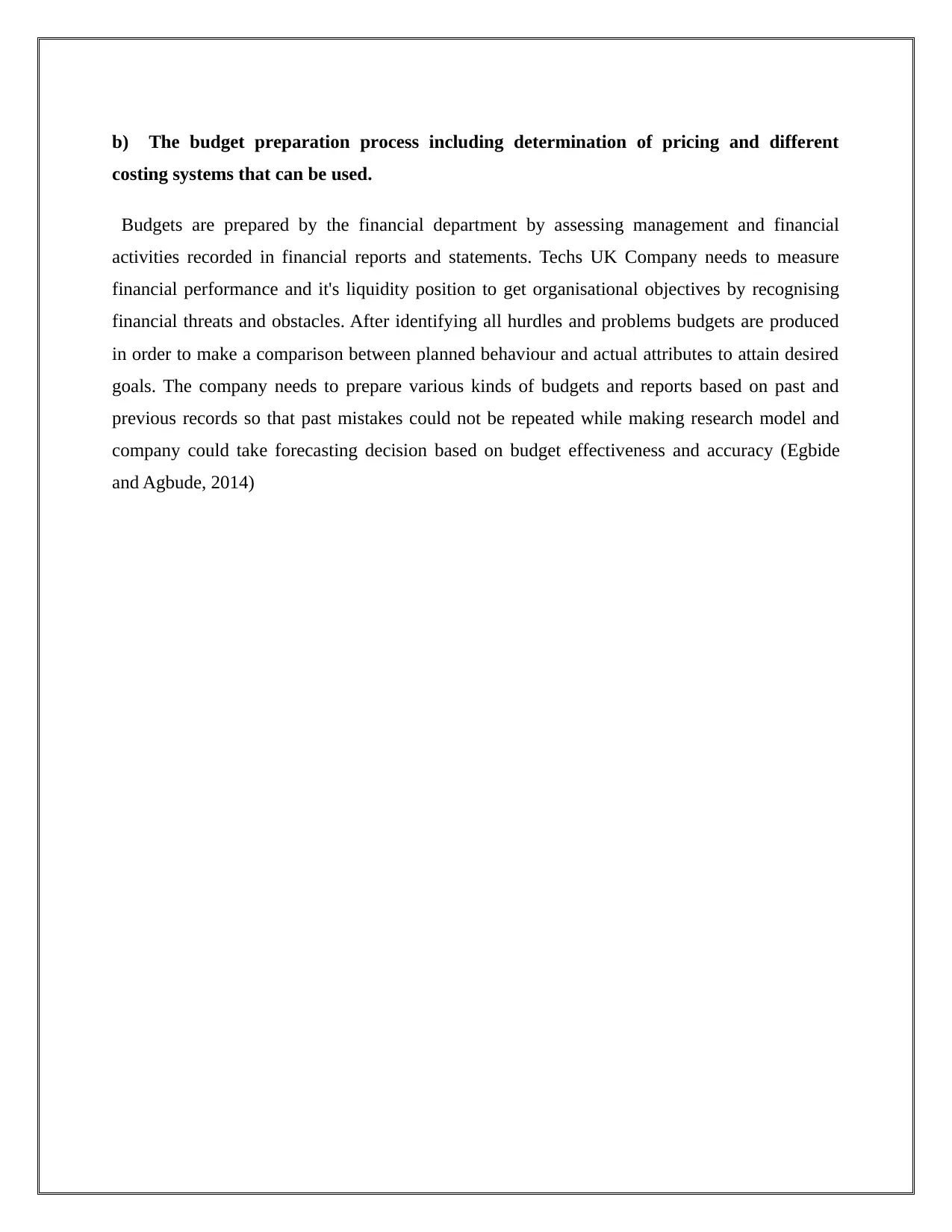
b) The budget preparation process including determination of pricing and different
costing systems that can be used.
Budgets are prepared by the financial department by assessing management and financial
activities recorded in financial reports and statements. Techs UK Company needs to measure
financial performance and it's liquidity position to get organisational objectives by recognising
financial threats and obstacles. After identifying all hurdles and problems budgets are produced
in order to make a comparison between planned behaviour and actual attributes to attain desired
goals. The company needs to prepare various kinds of budgets and reports based on past and
previous records so that past mistakes could not be repeated while making research model and
company could take forecasting decision based on budget effectiveness and accuracy (Egbide
and Agbude, 2014)
costing systems that can be used.
Budgets are prepared by the financial department by assessing management and financial
activities recorded in financial reports and statements. Techs UK Company needs to measure
financial performance and it's liquidity position to get organisational objectives by recognising
financial threats and obstacles. After identifying all hurdles and problems budgets are produced
in order to make a comparison between planned behaviour and actual attributes to attain desired
goals. The company needs to prepare various kinds of budgets and reports based on past and
previous records so that past mistakes could not be repeated while making research model and
company could take forecasting decision based on budget effectiveness and accuracy (Egbide
and Agbude, 2014)
Paraphrase This Document
Need a fresh take? Get an instant paraphrase of this document with our AI Paraphraser
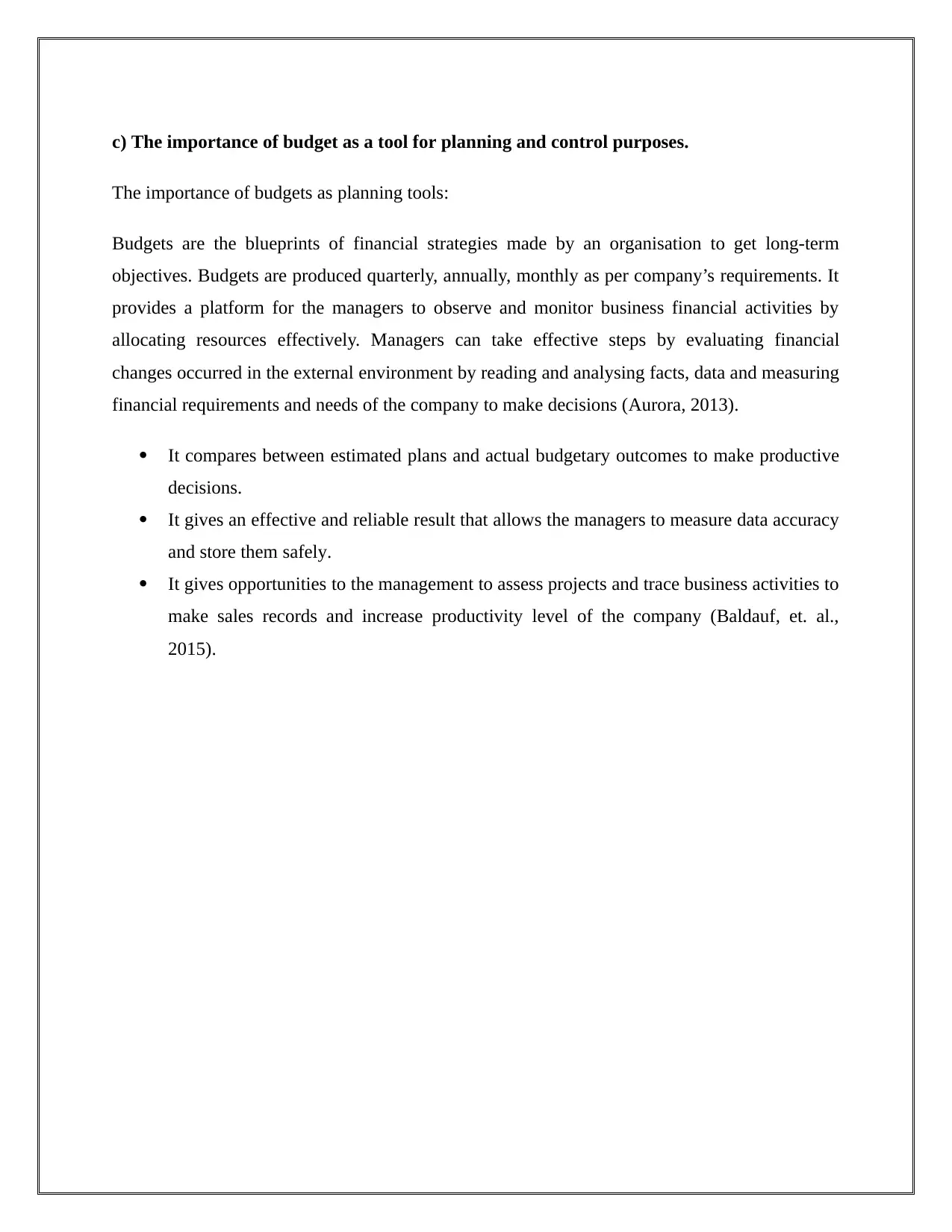
c) The importance of budget as a tool for planning and control purposes.
The importance of budgets as planning tools:
Budgets are the blueprints of financial strategies made by an organisation to get long-term
objectives. Budgets are produced quarterly, annually, monthly as per company’s requirements. It
provides a platform for the managers to observe and monitor business financial activities by
allocating resources effectively. Managers can take effective steps by evaluating financial
changes occurred in the external environment by reading and analysing facts, data and measuring
financial requirements and needs of the company to make decisions (Aurora, 2013).
It compares between estimated plans and actual budgetary outcomes to make productive
decisions.
It gives an effective and reliable result that allows the managers to measure data accuracy
and store them safely.
It gives opportunities to the management to assess projects and trace business activities to
make sales records and increase productivity level of the company (Baldauf, et. al.,
2015).
The importance of budgets as planning tools:
Budgets are the blueprints of financial strategies made by an organisation to get long-term
objectives. Budgets are produced quarterly, annually, monthly as per company’s requirements. It
provides a platform for the managers to observe and monitor business financial activities by
allocating resources effectively. Managers can take effective steps by evaluating financial
changes occurred in the external environment by reading and analysing facts, data and measuring
financial requirements and needs of the company to make decisions (Aurora, 2013).
It compares between estimated plans and actual budgetary outcomes to make productive
decisions.
It gives an effective and reliable result that allows the managers to measure data accuracy
and store them safely.
It gives opportunities to the management to assess projects and trace business activities to
make sales records and increase productivity level of the company (Baldauf, et. al.,
2015).
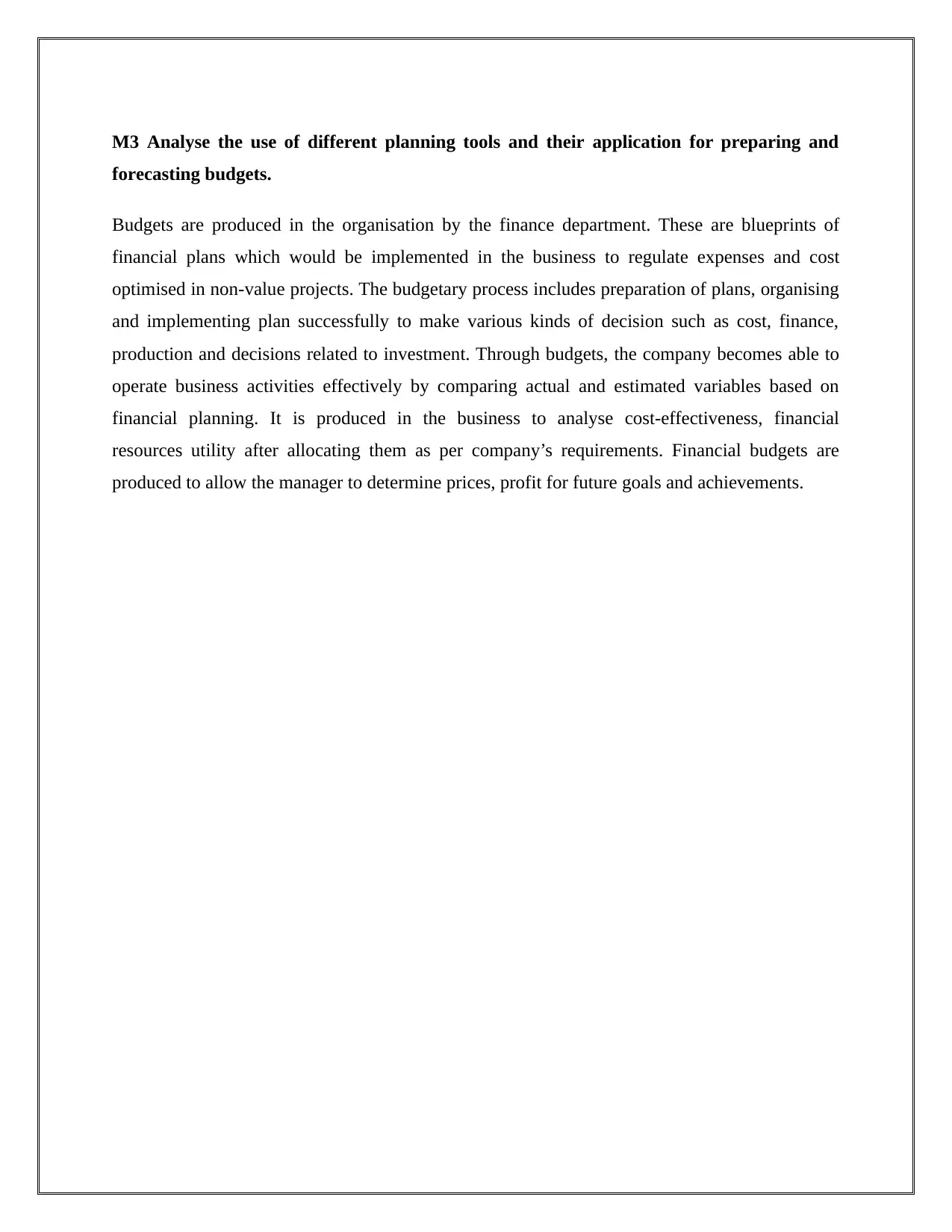
M3 Analyse the use of different planning tools and their application for preparing and
forecasting budgets.
Budgets are produced in the organisation by the finance department. These are blueprints of
financial plans which would be implemented in the business to regulate expenses and cost
optimised in non-value projects. The budgetary process includes preparation of plans, organising
and implementing plan successfully to make various kinds of decision such as cost, finance,
production and decisions related to investment. Through budgets, the company becomes able to
operate business activities effectively by comparing actual and estimated variables based on
financial planning. It is produced in the business to analyse cost-effectiveness, financial
resources utility after allocating them as per company’s requirements. Financial budgets are
produced to allow the manager to determine prices, profit for future goals and achievements.
forecasting budgets.
Budgets are produced in the organisation by the finance department. These are blueprints of
financial plans which would be implemented in the business to regulate expenses and cost
optimised in non-value projects. The budgetary process includes preparation of plans, organising
and implementing plan successfully to make various kinds of decision such as cost, finance,
production and decisions related to investment. Through budgets, the company becomes able to
operate business activities effectively by comparing actual and estimated variables based on
financial planning. It is produced in the business to analyse cost-effectiveness, financial
resources utility after allocating them as per company’s requirements. Financial budgets are
produced to allow the manager to determine prices, profit for future goals and achievements.
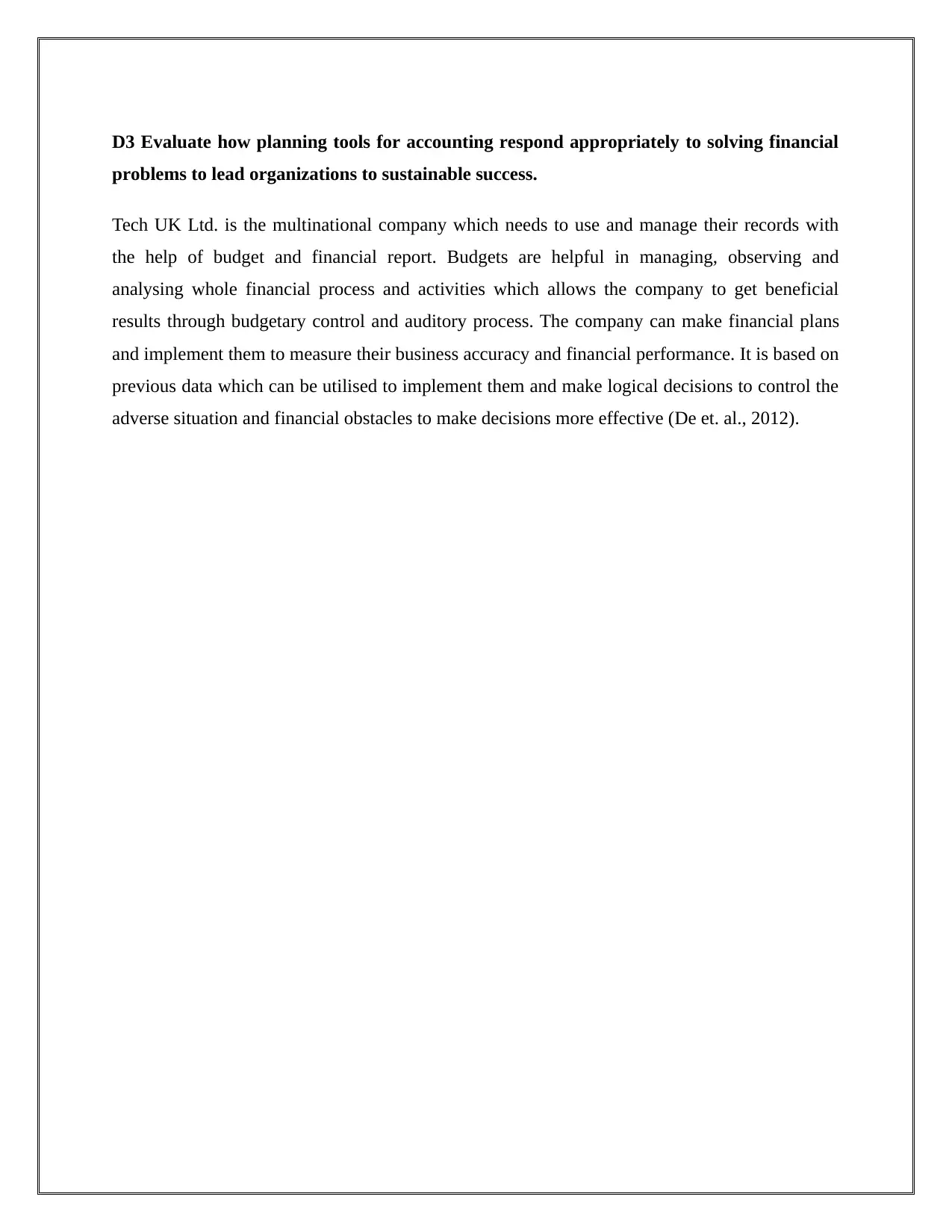
D3 Evaluate how planning tools for accounting respond appropriately to solving financial
problems to lead organizations to sustainable success.
Tech UK Ltd. is the multinational company which needs to use and manage their records with
the help of budget and financial report. Budgets are helpful in managing, observing and
analysing whole financial process and activities which allows the company to get beneficial
results through budgetary control and auditory process. The company can make financial plans
and implement them to measure their business accuracy and financial performance. It is based on
previous data which can be utilised to implement them and make logical decisions to control the
adverse situation and financial obstacles to make decisions more effective (De et. al., 2012).
problems to lead organizations to sustainable success.
Tech UK Ltd. is the multinational company which needs to use and manage their records with
the help of budget and financial report. Budgets are helpful in managing, observing and
analysing whole financial process and activities which allows the company to get beneficial
results through budgetary control and auditory process. The company can make financial plans
and implement them to measure their business accuracy and financial performance. It is based on
previous data which can be utilised to implement them and make logical decisions to control the
adverse situation and financial obstacles to make decisions more effective (De et. al., 2012).
Secure Best Marks with AI Grader
Need help grading? Try our AI Grader for instant feedback on your assignments.
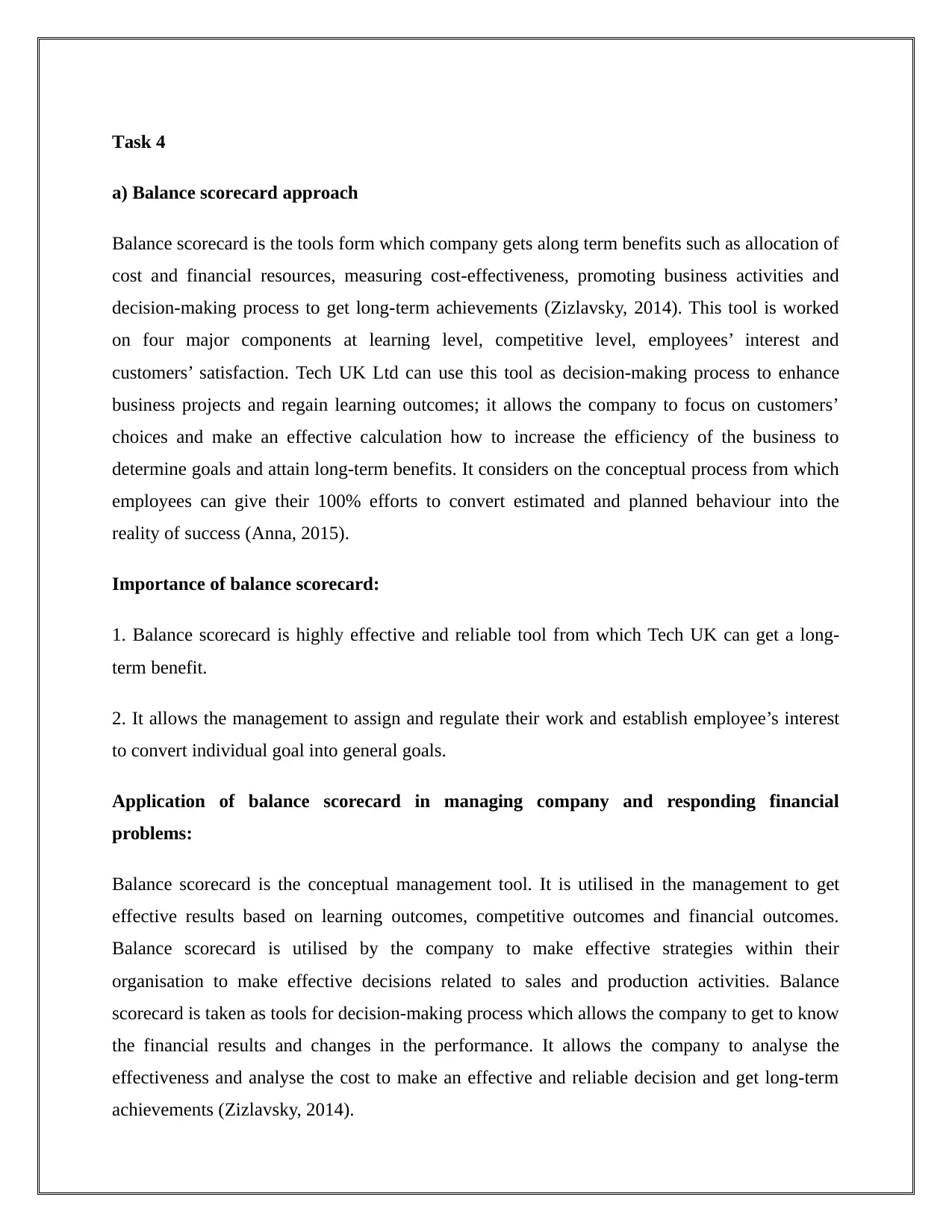
Task 4
a) Balance scorecard approach
Balance scorecard is the tools form which company gets along term benefits such as allocation of
cost and financial resources, measuring cost-effectiveness, promoting business activities and
decision-making process to get long-term achievements (Zizlavsky, 2014). This tool is worked
on four major components at learning level, competitive level, employees’ interest and
customers’ satisfaction. Tech UK Ltd can use this tool as decision-making process to enhance
business projects and regain learning outcomes; it allows the company to focus on customers’
choices and make an effective calculation how to increase the efficiency of the business to
determine goals and attain long-term benefits. It considers on the conceptual process from which
employees can give their 100% efforts to convert estimated and planned behaviour into the
reality of success (Anna, 2015).
Importance of balance scorecard:
1. Balance scorecard is highly effective and reliable tool from which Tech UK can get a long-
term benefit.
2. It allows the management to assign and regulate their work and establish employee’s interest
to convert individual goal into general goals.
Application of balance scorecard in managing company and responding financial
problems:
Balance scorecard is the conceptual management tool. It is utilised in the management to get
effective results based on learning outcomes, competitive outcomes and financial outcomes.
Balance scorecard is utilised by the company to make effective strategies within their
organisation to make effective decisions related to sales and production activities. Balance
scorecard is taken as tools for decision-making process which allows the company to get to know
the financial results and changes in the performance. It allows the company to analyse the
effectiveness and analyse the cost to make an effective and reliable decision and get long-term
achievements (Zizlavsky, 2014).
a) Balance scorecard approach
Balance scorecard is the tools form which company gets along term benefits such as allocation of
cost and financial resources, measuring cost-effectiveness, promoting business activities and
decision-making process to get long-term achievements (Zizlavsky, 2014). This tool is worked
on four major components at learning level, competitive level, employees’ interest and
customers’ satisfaction. Tech UK Ltd can use this tool as decision-making process to enhance
business projects and regain learning outcomes; it allows the company to focus on customers’
choices and make an effective calculation how to increase the efficiency of the business to
determine goals and attain long-term benefits. It considers on the conceptual process from which
employees can give their 100% efforts to convert estimated and planned behaviour into the
reality of success (Anna, 2015).
Importance of balance scorecard:
1. Balance scorecard is highly effective and reliable tool from which Tech UK can get a long-
term benefit.
2. It allows the management to assign and regulate their work and establish employee’s interest
to convert individual goal into general goals.
Application of balance scorecard in managing company and responding financial
problems:
Balance scorecard is the conceptual management tool. It is utilised in the management to get
effective results based on learning outcomes, competitive outcomes and financial outcomes.
Balance scorecard is utilised by the company to make effective strategies within their
organisation to make effective decisions related to sales and production activities. Balance
scorecard is taken as tools for decision-making process which allows the company to get to know
the financial results and changes in the performance. It allows the company to analyse the
effectiveness and analyse the cost to make an effective and reliable decision and get long-term
achievements (Zizlavsky, 2014).
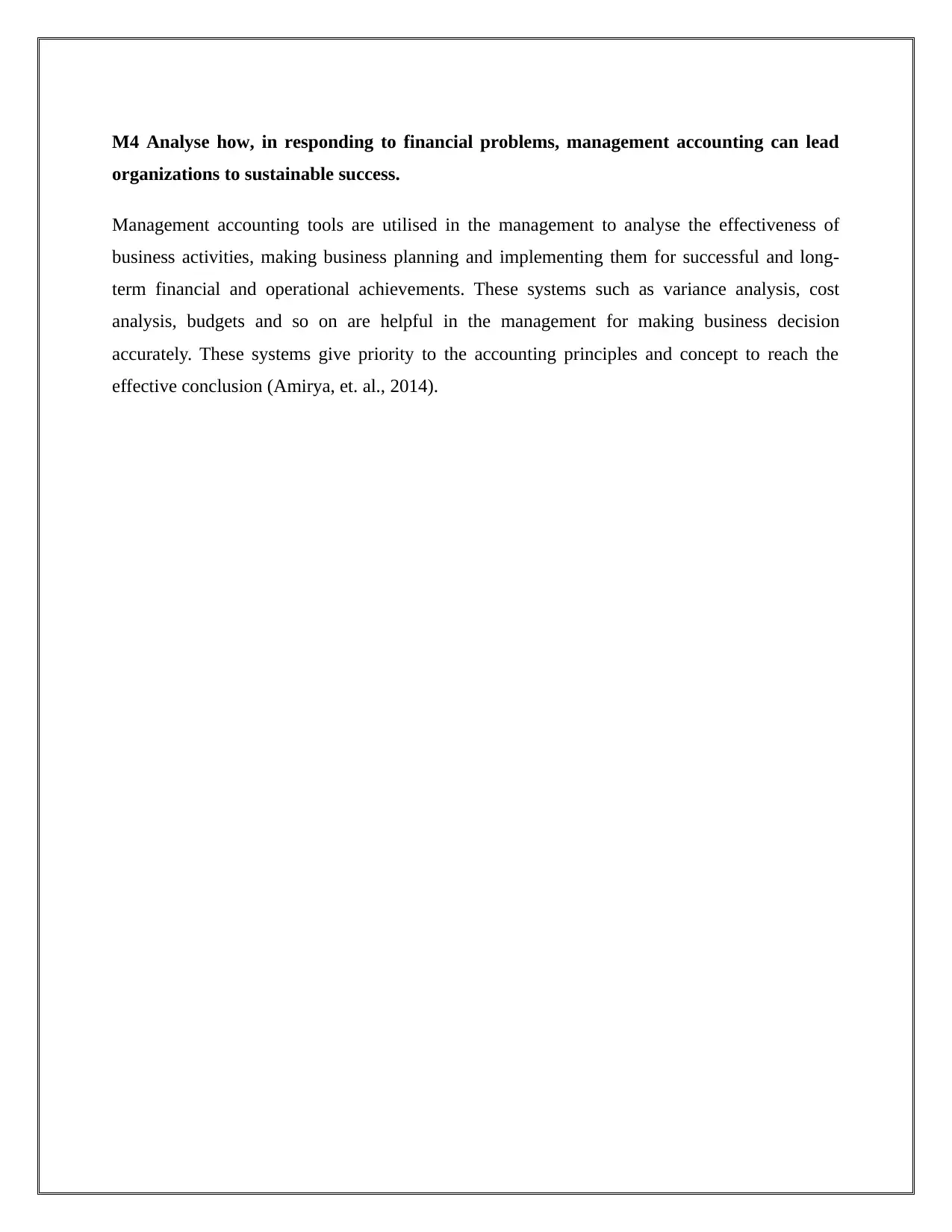
M4 Analyse how, in responding to financial problems, management accounting can lead
organizations to sustainable success.
Management accounting tools are utilised in the management to analyse the effectiveness of
business activities, making business planning and implementing them for successful and long-
term financial and operational achievements. These systems such as variance analysis, cost
analysis, budgets and so on are helpful in the management for making business decision
accurately. These systems give priority to the accounting principles and concept to reach the
effective conclusion (Amirya, et. al., 2014).
organizations to sustainable success.
Management accounting tools are utilised in the management to analyse the effectiveness of
business activities, making business planning and implementing them for successful and long-
term financial and operational achievements. These systems such as variance analysis, cost
analysis, budgets and so on are helpful in the management for making business decision
accurately. These systems give priority to the accounting principles and concept to reach the
effective conclusion (Amirya, et. al., 2014).
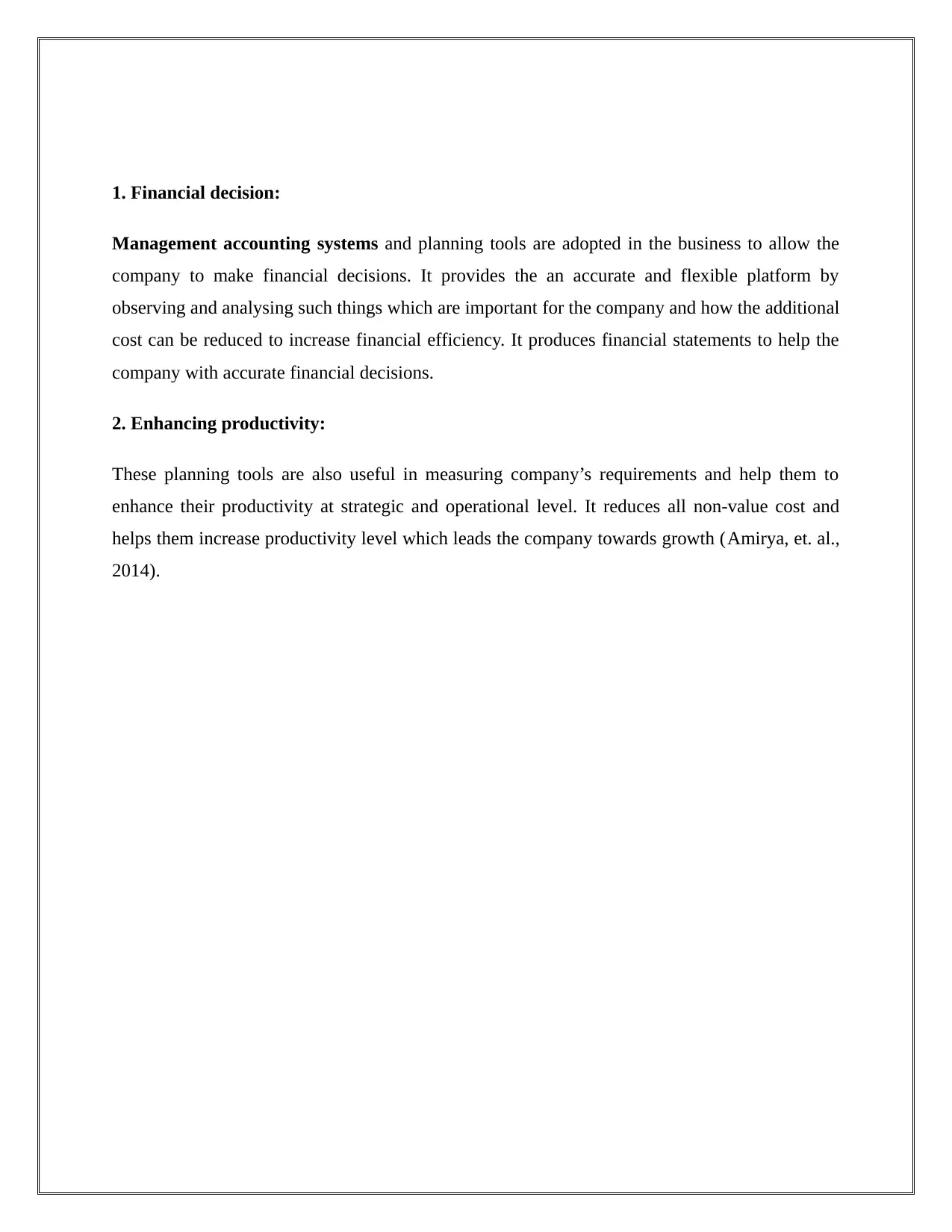
1. Financial decision:
Management accounting systems and planning tools are adopted in the business to allow the
company to make financial decisions. It provides the an accurate and flexible platform by
observing and analysing such things which are important for the company and how the additional
cost can be reduced to increase financial efficiency. It produces financial statements to help the
company with accurate financial decisions.
2. Enhancing productivity:
These planning tools are also useful in measuring company’s requirements and help them to
enhance their productivity at strategic and operational level. It reduces all non-value cost and
helps them increase productivity level which leads the company towards growth (Amirya, et. al.,
2014).
Management accounting systems and planning tools are adopted in the business to allow the
company to make financial decisions. It provides the an accurate and flexible platform by
observing and analysing such things which are important for the company and how the additional
cost can be reduced to increase financial efficiency. It produces financial statements to help the
company with accurate financial decisions.
2. Enhancing productivity:
These planning tools are also useful in measuring company’s requirements and help them to
enhance their productivity at strategic and operational level. It reduces all non-value cost and
helps them increase productivity level which leads the company towards growth (Amirya, et. al.,
2014).
Paraphrase This Document
Need a fresh take? Get an instant paraphrase of this document with our AI Paraphraser
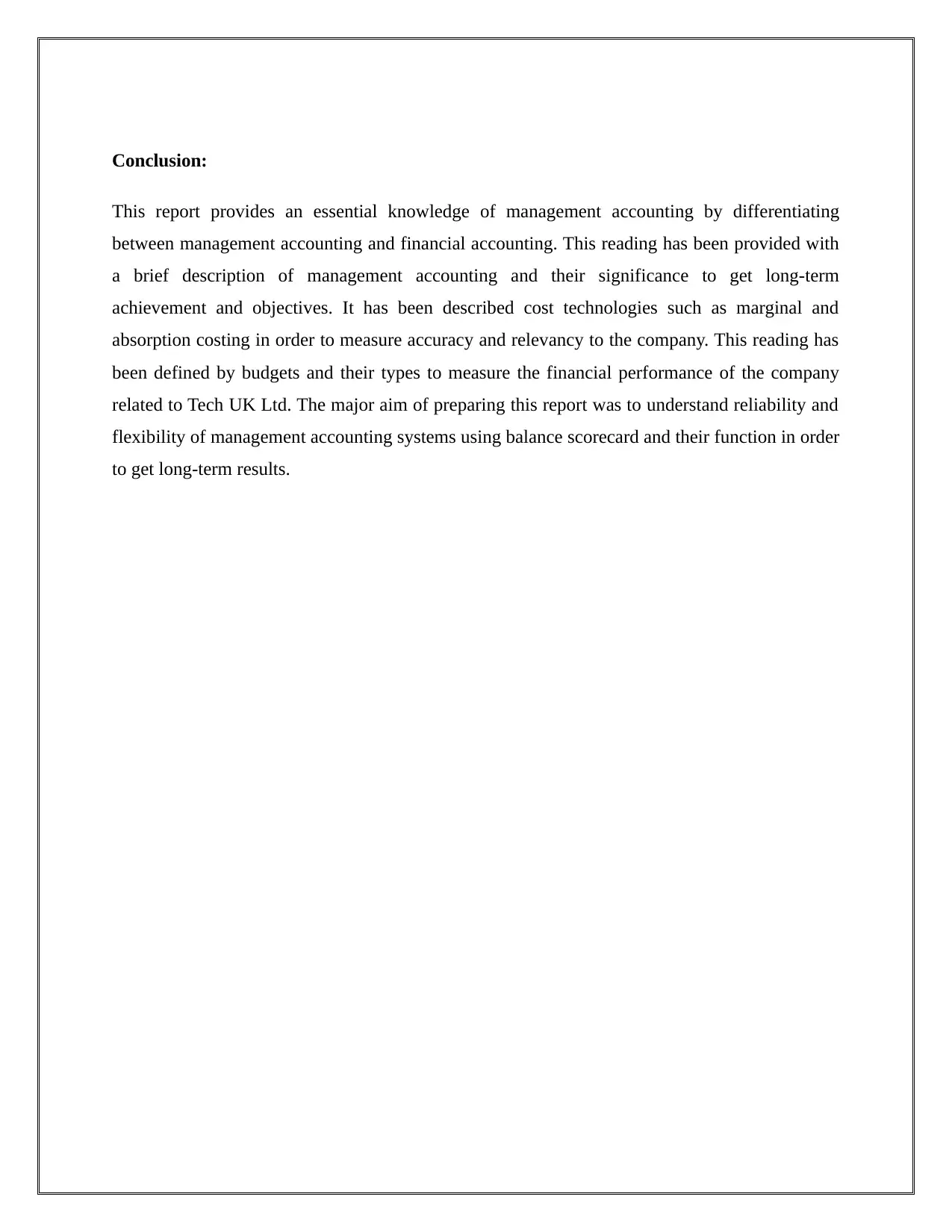
Conclusion:
This report provides an essential knowledge of management accounting by differentiating
between management accounting and financial accounting. This reading has been provided with
a brief description of management accounting and their significance to get long-term
achievement and objectives. It has been described cost technologies such as marginal and
absorption costing in order to measure accuracy and relevancy to the company. This reading has
been defined by budgets and their types to measure the financial performance of the company
related to Tech UK Ltd. The major aim of preparing this report was to understand reliability and
flexibility of management accounting systems using balance scorecard and their function in order
to get long-term results.
This report provides an essential knowledge of management accounting by differentiating
between management accounting and financial accounting. This reading has been provided with
a brief description of management accounting and their significance to get long-term
achievement and objectives. It has been described cost technologies such as marginal and
absorption costing in order to measure accuracy and relevancy to the company. This reading has
been defined by budgets and their types to measure the financial performance of the company
related to Tech UK Ltd. The major aim of preparing this report was to understand reliability and
flexibility of management accounting systems using balance scorecard and their function in order
to get long-term results.
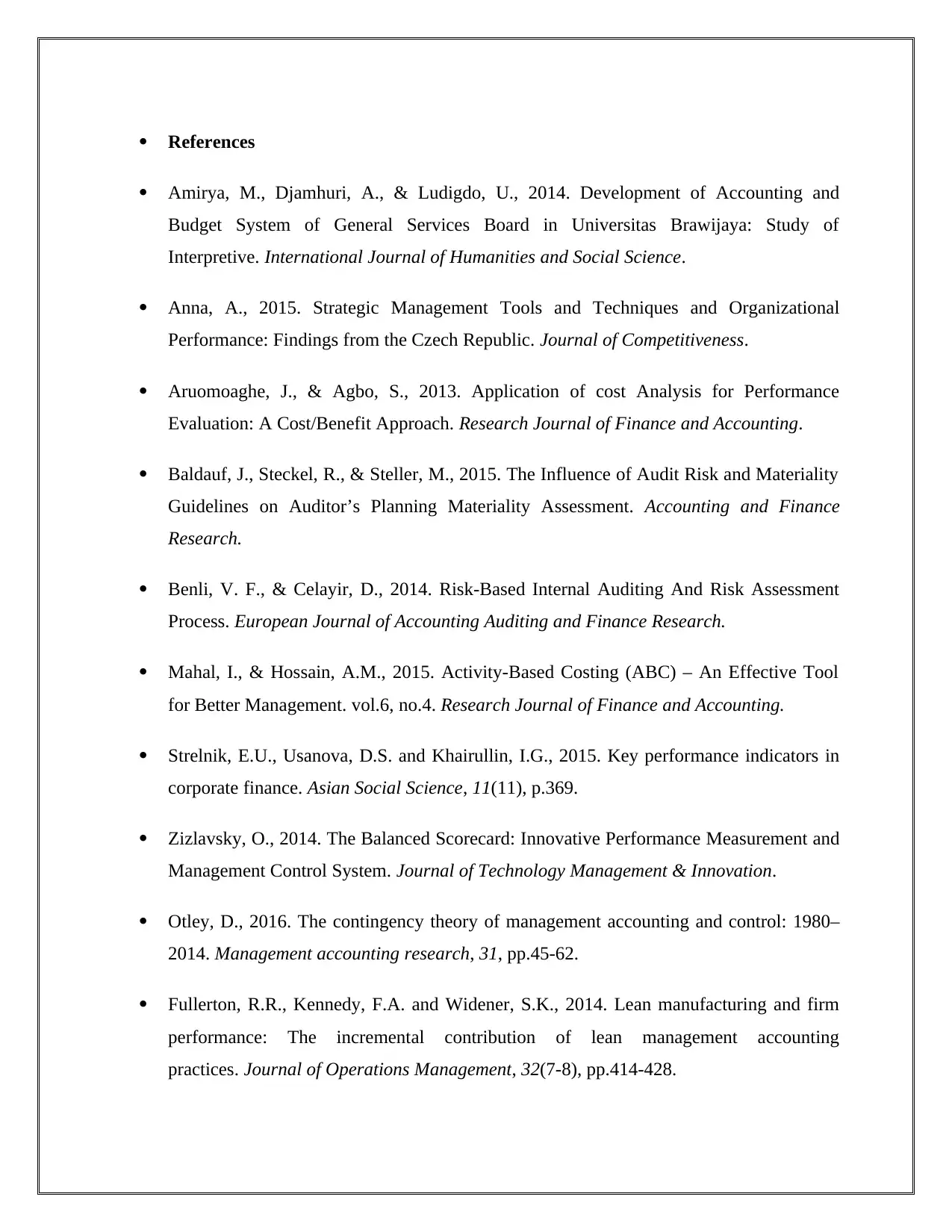
References
Amirya, M., Djamhuri, A., & Ludigdo, U., 2014. Development of Accounting and
Budget System of General Services Board in Universitas Brawijaya: Study of
Interpretive. International Journal of Humanities and Social Science.
Anna, A., 2015. Strategic Management Tools and Techniques and Organizational
Performance: Findings from the Czech Republic. Journal of Competitiveness.
Aruomoaghe, J., & Agbo, S., 2013. Application of cost Analysis for Performance
Evaluation: A Cost/Benefit Approach. Research Journal of Finance and Accounting.
Baldauf, J., Steckel, R., & Steller, M., 2015. The Influence of Audit Risk and Materiality
Guidelines on Auditor’s Planning Materiality Assessment. Accounting and Finance
Research.
Benli, V. F., & Celayir, D., 2014. Risk-Based Internal Auditing And Risk Assessment
Process. European Journal of Accounting Auditing and Finance Research.
Mahal, I., & Hossain, A.M., 2015. Activity-Based Costing (ABC) – An Effective Tool
for Better Management. vol.6, no.4. Research Journal of Finance and Accounting.
Strelnik, E.U., Usanova, D.S. and Khairullin, I.G., 2015. Key performance indicators in
corporate finance. Asian Social Science, 11(11), p.369.
Zizlavsky, O., 2014. The Balanced Scorecard: Innovative Performance Measurement and
Management Control System. Journal of Technology Management & Innovation.
Otley, D., 2016. The contingency theory of management accounting and control: 1980–
2014. Management accounting research, 31, pp.45-62.
Fullerton, R.R., Kennedy, F.A. and Widener, S.K., 2014. Lean manufacturing and firm
performance: The incremental contribution of lean management accounting
practices. Journal of Operations Management, 32(7-8), pp.414-428.
Amirya, M., Djamhuri, A., & Ludigdo, U., 2014. Development of Accounting and
Budget System of General Services Board in Universitas Brawijaya: Study of
Interpretive. International Journal of Humanities and Social Science.
Anna, A., 2015. Strategic Management Tools and Techniques and Organizational
Performance: Findings from the Czech Republic. Journal of Competitiveness.
Aruomoaghe, J., & Agbo, S., 2013. Application of cost Analysis for Performance
Evaluation: A Cost/Benefit Approach. Research Journal of Finance and Accounting.
Baldauf, J., Steckel, R., & Steller, M., 2015. The Influence of Audit Risk and Materiality
Guidelines on Auditor’s Planning Materiality Assessment. Accounting and Finance
Research.
Benli, V. F., & Celayir, D., 2014. Risk-Based Internal Auditing And Risk Assessment
Process. European Journal of Accounting Auditing and Finance Research.
Mahal, I., & Hossain, A.M., 2015. Activity-Based Costing (ABC) – An Effective Tool
for Better Management. vol.6, no.4. Research Journal of Finance and Accounting.
Strelnik, E.U., Usanova, D.S. and Khairullin, I.G., 2015. Key performance indicators in
corporate finance. Asian Social Science, 11(11), p.369.
Zizlavsky, O., 2014. The Balanced Scorecard: Innovative Performance Measurement and
Management Control System. Journal of Technology Management & Innovation.
Otley, D., 2016. The contingency theory of management accounting and control: 1980–
2014. Management accounting research, 31, pp.45-62.
Fullerton, R.R., Kennedy, F.A. and Widener, S.K., 2014. Lean manufacturing and firm
performance: The incremental contribution of lean management accounting
practices. Journal of Operations Management, 32(7-8), pp.414-428.
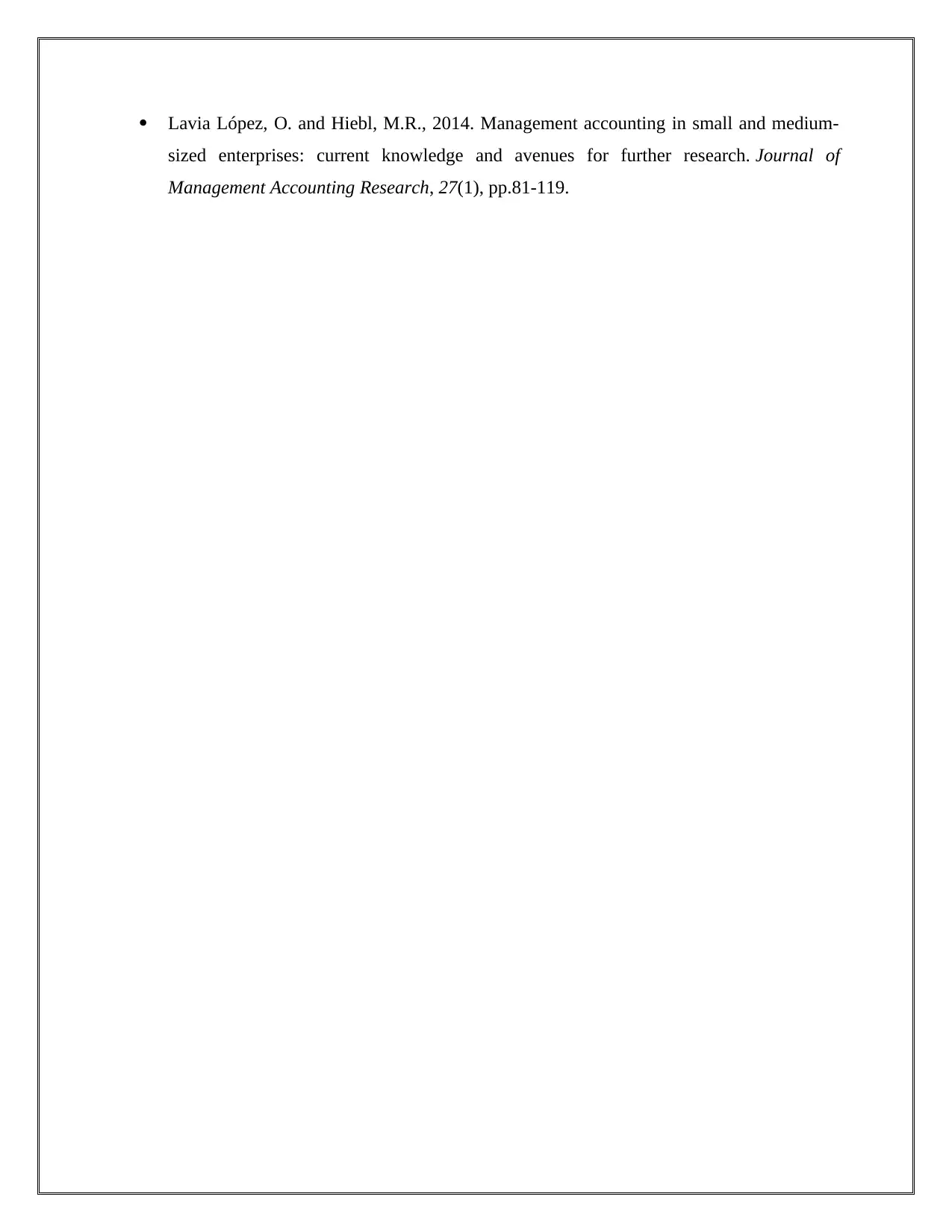
Lavia López, O. and Hiebl, M.R., 2014. Management accounting in small and medium-
sized enterprises: current knowledge and avenues for further research. Journal of
Management Accounting Research, 27(1), pp.81-119.
sized enterprises: current knowledge and avenues for further research. Journal of
Management Accounting Research, 27(1), pp.81-119.
1 out of 28
Related Documents
Your All-in-One AI-Powered Toolkit for Academic Success.
+13062052269
info@desklib.com
Available 24*7 on WhatsApp / Email
![[object Object]](/_next/static/media/star-bottom.7253800d.svg)
Unlock your academic potential
© 2024 | Zucol Services PVT LTD | All rights reserved.





